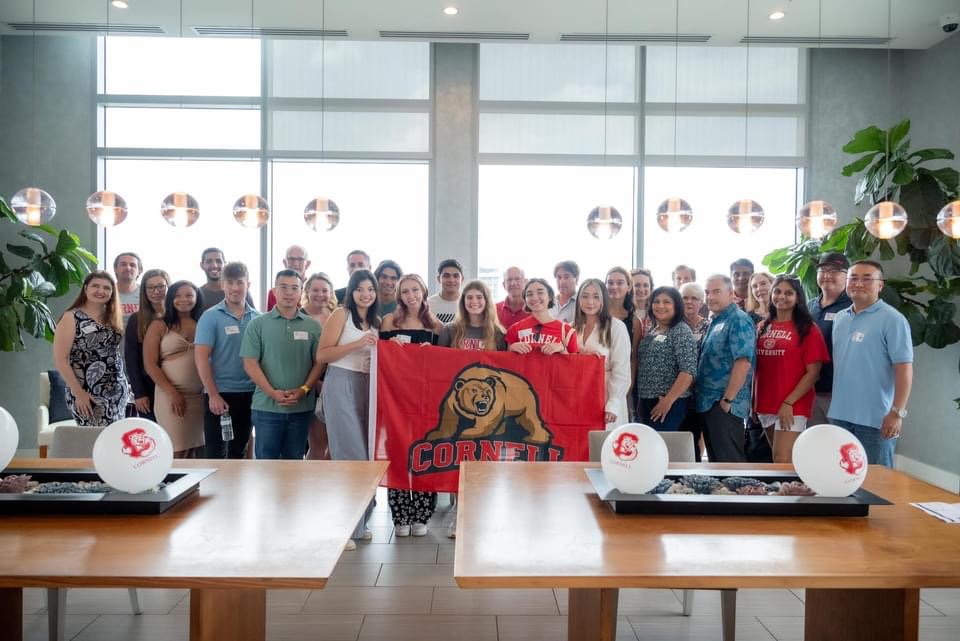Hotelie Hall of Fame Inductees
Game Changers – 2023
Game Changers – 2023
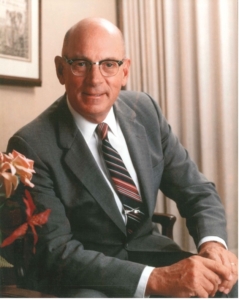 “I would have to say dad was a game changer in how they went about franchising the Burger King system. To put it simply, it was his innovation! You must understand that in the early 1950’s there were very few franchise operators. Dad and Dave made being a franchisee a success by implementing the systems and equipping them with everything they needed to open a new location. They created two subsidiaries to accomplish this goal. First, opening a commissary called Distron that supplied all the food and paper products needed to operate daily. They also created Davmor that designed and built all the equipment needed to open a new location. They would pack everything in one semi-trailer and deliver it to a new location all at once. In this way they controlled the quality and uniformity throughout the brand which set them apart from other franchise concepts. Finally, they mandated that each franchisee attend Whopper College in Miami and work in one of the company locations prior to opening their first franchise location.” Whit McLamore ‘78
“I would have to say dad was a game changer in how they went about franchising the Burger King system. To put it simply, it was his innovation! You must understand that in the early 1950’s there were very few franchise operators. Dad and Dave made being a franchisee a success by implementing the systems and equipping them with everything they needed to open a new location. They created two subsidiaries to accomplish this goal. First, opening a commissary called Distron that supplied all the food and paper products needed to operate daily. They also created Davmor that designed and built all the equipment needed to open a new location. They would pack everything in one semi-trailer and deliver it to a new location all at once. In this way they controlled the quality and uniformity throughout the brand which set them apart from other franchise concepts. Finally, they mandated that each franchisee attend Whopper College in Miami and work in one of the company locations prior to opening their first franchise location.” Whit McLamore ‘78
James W. McLamore was born May 30, 1926 and grew up in Central Valley, NY. He attended Mount Herman Prep School in Northfield, MA. In June of 1943 he “hit the road” hitchhiking his way to Cornell. He was told Professor Herbert Whetzel, who was the current Chairman of the Department of Plant Pathology at the New York College of Agriculture, had written an article implying he had helped students find jobs that aided them paying for lodging and tuition. Jim loved telling stories. He described in his book, “The Burger King – Jim McLamore and the Building of an Empire” just how he came to the Hotel School. The story has been shortened for brevity.
Professor Whetzel had taken in students who worked at his home and tended his garden. He was currently in search of a student to assume such a role. This was a way a student could earn money for room and board and hopefully earn enough extra money to pay for tuition and incidental expenses. The tuition at Cornell was only $200.00 a trimester for a New York state resident, but I needed to pay it in advance before I could register for classes. My immediate objective was to find that $200.00.
The “Prof”, as I would come to call him, knew that I was interested in becoming his “student boy” and he talked to me at considerable length about that. It piqued his interest when I told him that I had grown up on a farm. He made a point of showing me his home and his garden which he was very proud of. After the tour we sat down on the steps of his back porch. It was a beautiful late afternoon with the sun coming in over the lawn and his garden. He asked me a lot of questions, mostly about my home, family and experiences at school and on the farm. Obviously, he was trying to decide whether or not to offer me the job.
I remember his turning to me at one point and asking, “Do you know what mycelium is?” I told him that I did and went on to explain that mycelium had some connection with fungi of various kinds including mushrooms and toadstools. That answer was essentially correct, and it was right out of my biology studies at Mt. Hermon. I am sure that my marginally acceptable response to his question had something to do with his offering me the job. He simply turned to me and said, “Son, I think you will do!”
I was delighted to have found a job in such a nice place with such a lovely family. Earning my keep would enable me to get on with my college education. Professor Whetzel explained the terms under which I would live and work at his home. He would charge me $.50 a night for my lodging and $.50 for each meal that I ate in his home. In return he would pay me $.50 an hour for every hour that I worked in his garden or around the house. We would settle up once a week as to how much excess or deficiency I had based on this arrangement.
The “Prof” threw the key question at me and asked how I was going to pay the tuition. He reminded me that student registration was only three days off and asked, “How much money do you have, son?” I reached in my pocket and placed all the money I had on the top step of the porch where we were both sitting. We counted it together and it came to $11.34. Turning to me he said, “Look son, I wasn’t talking about your pocket money, I was talking about how much money you have to pay your tuition. You realize don’t you that it is due in a few days.” I said, “Well, that’s all the money I have, Professor Whetzel.” He seemed annoyed and impatient with that response and said, “Well, alright then, where are you going to get the tuition money. How much does your family have?” I said, “My father doesn’t have any money.” A bit more annoyed, he said, “Goodness sakes, boy, how do you expect to get into this university?” I said, “Well, I was told that boys you accepted could work their way through college, so I just assumed that somehow you would help me do that.” He just couldn’t believe that I had come all the way to Ithaca without making arrangements to pay for my tuition.
After thinking about the problem, he said, “Well, I know the Dean of the Hotel School, Professor Meek. I’ll have a talk with him about a possible scholarship and tomorrow I’ll introduce you to the Treasurer of the University. We can talk to him about the possibility of obtaining a student loan.” The next day Professor Meek said he thought he might be able to get me a $50.00 scholarship from the American Hotel Association and Mr. Graham, representing the University, agreed to loan me $100.00. Professor Whetzel made up the difference by loaning me $50.00, which gave me the needed $200.00 tuition and the start I needed.
So that is how he became a Hotelie! It’s also the reason he has supported so many educational institutions throughout his life and continues to support them through the McLamore Family Foundation today.
 Jim met his wife, Nancy Nichol, while at school and they were married the spring of 1947 shortly before graduation. Finding a job back then was difficult with all the returning servicemen looking for work too. Eventually he landed a job directing a YMCA Cafeteria in Wilmington, Delaware. The leadership of the YMCA was pleasantly surprised at how successful Jim had made the cafeteria and its banquet facilities.
Jim met his wife, Nancy Nichol, while at school and they were married the spring of 1947 shortly before graduation. Finding a job back then was difficult with all the returning servicemen looking for work too. Eventually he landed a job directing a YMCA Cafeteria in Wilmington, Delaware. The leadership of the YMCA was pleasantly surprised at how successful Jim had made the cafeteria and its banquet facilities.
A local restaurant owner recruited him away, but their relationship didn’t last long. He decided to open his own 14 seat restaurant “The Colonial Inn” shortly thereafter and made it a very successful operation earning $15,000 on sales of $90,000 in its first year. His success there gave him the confidence to open a second restaurant in Nancy’s hometown – Miami. McLamore’s Brickell Bridge Restaurant was an eighty-seat restaurant on Brickell Avenue. Unfortunately, he committed to leasing space in February when Miami was booming and didn’t realize it was so seasonal. Through perseverance he made it successful.
He met Dave Edgerton not long after moving to Miami. Dave was the first franchisee of “Insta Burger King” out of Jacksonville, FL. He had opened his first location in March of 1954 and wanted Jim to join him in the business. Jim thought the concept was a good idea, so he sold his other two restaurants and matched his capital of $20,000 in June creating Burger King of Miami, Inc. which later became Burger King Corporation. They quickly added three additional restaurants and fine-tuned the concept over the first two years. Their limited menu consisted mostly of 19 cent burgers, 19 cent fries and 19 cent shakes. Their success was limited but they continue to grow the concept. It really took off with the invention of the Whopper and the flame broiler in 1957. They eventually purchased the rights to the name Burger King from the Insta Burger King franchisor in Jacksonville and grew the company to 400 units when they sold to Pillsbury in 1967.
Jim stayed on as President and, later Chairman of Burger King until 1972 when he retired at a young 46 years old. Being too young to be inactive he involved himself in many philanthropic and community endeavors as well as being a board member of many companies around the US. A short list would include:
Member: Pillsbury Board of Directors
Member: Ryder System Board of Directors
Member: Lennar Board of Directors
Member: Storer Broadcasting Board of Directors
Member: Southeast Bank Board of Directors
Member: University of Miami Board of Trustees, 1973-1996
Chairman: University of Miami Board of Trustees, 1980-1990
Member: Northfield Mount Herman School Board of Trustees, 1968-1979
Member: Orange Bowl Committee (Chairman one year)
Chairman: United Way of Dade County, 1974
Chairman: Fairchild Tropical Garden Board of Directors, 1975-1996
President: National Restaurant Association Board of Directors, 1978
Member: Northfield Mount Herman School Board of Trustees, 1968-1979
Minority Owner: Miami Dolphins, 1968 – 1973
Member: Florida Council of 100, 1986-1996
Chairman: WPBT Channel 2, 1978-1979
One of Jim’s greatest accomplishments was working with Tad Foote, President of the University of Miami. Together they spearheaded the largest fundraising campaign ever attempted by any College or University to date. Their commitment was to raise $400 million in a five-year campaign. They impressed the entire higher education collective by raising $517,500,000 when it concluded. He always said it was important to give back and he did that throughout his adult life.
Jim passed away in 1996 at 70. He and Nancy have left a legacy of giving back through the continued efforts of the McLamore Family Foundation. The family is both honored and grateful you have chosen him as the 2023 recipient of this tremendous award.
Here is an excerpt from The Burger King book as published in The Flame magazine in September 1996.
https://www.thebkbook.com/stories/the-vision-and-uncommon-touch-of-jim-mclamore
This is a video of Jim explaining how the Whopper came into existence, a fun clip from the video BKC put together for the 30th anniversary.
 John Harney was born outside of Cleveland in 1930. The Depression and family tragedies shattered his family. He was farmed out to relatives at age 8. The first relative was truly a farmer. John did not like plucking potatoes in the cold ground, so he moved to Manchester, VT to an uncle that had several country inns. There he fell in love with hotels. Also he fell in love with the love of his life: Elyse. She encouraged him to apply to Cornell after his Korean War service.
John Harney was born outside of Cleveland in 1930. The Depression and family tragedies shattered his family. He was farmed out to relatives at age 8. The first relative was truly a farmer. John did not like plucking potatoes in the cold ground, so he moved to Manchester, VT to an uncle that had several country inns. There he fell in love with hotels. Also he fell in love with the love of his life: Elyse. She encouraged him to apply to Cornell after his Korean War service.
That was a special time at the Hotel School with many older students and many with families already. The staff at the School were so kind to him and his growing family. Important staff members: Edna Osborn, Mary Loughnan and Helen Ayers were the linchpins for veterans returning to school. The government deferred GI Bills funding, so money was a scramble. Everyone had two jobs, Chuck Feeney maybe had three, but faculty and friends all pulled together. At that time Bob Beck (later Dean Beck ) taught accounting and John became his Teaching Assistant. By 1956 John & Elyse had two babies and the entire student loan fund with his last semester unfunded. Dean Meek gave John a special project so that he could finish early. The Hotel School was where he made many lifelong friends.
 After managing a small inn in Connecticut, he started Harney & Sons Teas. Beside no money there were no sons in that fledgling company. His two sons did join him later. As a Cornell friend told him, the first million is the hardest. Harney & Sons is now consumed on all 7 continents, even Antarctica. John never forgot about the School on the Hill. He interviewed prospective students. Set a record for the number of HECs attended. And was proud to donate an office in the Food & Beverage area occupied by The Cheryl Stanley.
After managing a small inn in Connecticut, he started Harney & Sons Teas. Beside no money there were no sons in that fledgling company. His two sons did join him later. As a Cornell friend told him, the first million is the hardest. Harney & Sons is now consumed on all 7 continents, even Antarctica. John never forgot about the School on the Hill. He interviewed prospective students. Set a record for the number of HECs attended. And was proud to donate an office in the Food & Beverage area occupied by The Cheryl Stanley.
Bon Appetit magazine named him Food Artisan of the Year. And the U.S Tea Association named him Man of the Year in 2011. He was proud to have his tea enjoyed at the Historic Royal Palaces over in the UK and all the great hotels, restaurants & stores. All this would never have been possible without the support of the Hotel School family. All hail Cornell!
From the New York Times, June 26, 2014
 John Harney, Missionary Who Spread the ‘Gospel of Tea,’ Dies at 83
John Harney, Missionary Who Spread the ‘Gospel of Tea,’ Dies at 83By Paul Vitello
June 26, 2014
John Harney, the founder of Harney & Sons, a specialty tea company that helped restore the American palate for high-quality teas, died on June 17 at his home in Salisbury, Conn. He was 83.
Mr. Harney was part of an informal community of American entrepreneurs and food pioneers who barnstormed the country in the 1980s and ’90s to acquaint restaurant managers, their luncheon patrons and the public — one afternoon-tea demonstration at a time — with the dying art of tea appreciation.
He conducted demonstrations for the waiters and waitresses at the Waldorf-Astoria in New York and for the book club at the public library in Rye, N.Y., introducing the nuances of aroma, body, complexity and aftertaste in loose teas from China, Africa and India to people whose experience with tea had often been limited to what came in store-bought tea bags.
“John became a missionary of tea,” said Peter F. Goggi, president of the Tea Association of the USA, a trade group.
An inveterate and jovial campaigner — he was involved in community affairs and politics, and helped secure the Republican nomination for a neighbor, James L. Buckley, in his unsuccessful campaign for the United States Senate in Connecticut in 1980 — Mr. Harney described his tea-promoting efforts, in a 2001 CNN interview, as part entrepreneurial and part inspirational:
“All we wanted to do was get out there and convert — sort of like St. John with his gospel of tea. That’s what I consider myself.”
Though far from re-establishing tea as the No. 1 beverage in America (status it lost as a tragic side effect, by tea lovers’ accounts, of the 1773 tea-tax protest that ignited the Revolutionary War), efforts by Mr. Harney and his like are credited with quadrupling tea consumption in the United States in the last two decades.
Harney & Sons, which began with a selection of six varieties in 1983, expanded its catalog to over 300 blends, many of them now standard fare at luxury hotels, including the Waldorf-Astoria and Ritz-Carlton in New York and the Dorchester in London.
The Historic Royal Palaces, which operates sites in Britain like Kensington Palace and the Tower of London, stocks its gift shops with a proprietary line of teas blended by Harney & Sons.
John David Harney was born on Aug. 26, 1930, in Lakewood, Ohio, to William and Hildegard Harney. His father, an engineer who moved frequently to find work in airplane factories, left his children with relatives after their mother died in the early 1940s, when John was 12. As a teenager he lived with an aunt and uncle who ran a country inn in Vermont.
He served in the Marine Corps from 1948 to 1952, then graduated from Cornell University’s School of Hotel Administration. By 1960, he had moved to Salisbury to become part owner and innkeeper of the White Hart Inn, a two-century-old restaurant and hotel.
It was at the White Hart that Mr. Harney, a committed coffee drinker, was converted to the gospel of tea. His St. John was Stanley Mason, an Englishman who had settled in northwest Connecticut after 50 years in the London tea trade. In retirement, Mr. Mason had started a small company to blend and package premium teas, and he persuaded Mr. Harney to add some to his menu.
Mr. Harney’s guests liked the teas so much that he bought Mr. Mason’s company, hired Mr. Mason as his consultant and began a 10-year apprenticeship in the tea trade. In 1983, two years after Mr. Mason died, Mr. Harney sold his share in the inn and established Harney & Sons with family help and a handful of employees.
The company now reports about $30 million in annual sales and employs 150 people. It imports about a million pounds of tea each year, which it sells in the United States and abroad in a wide variety of styles and packages at prices ranging from $2 to $500 a pound. It moved its packaging operations to Millerton, N.Y., in 2000.
Besides his son Michael, Mr. Harney is survived by his wife, Elyse; three other sons, John Jr., Keith and Paul; a daughter, Elyse; a sister, Susan Rooney; a brother, Jerry; and 10 grandchildren.
Mr. Harney remained modest about his expertise. But he held to two absolute rules in making a good cup of tea, whether using a camomile from Egypt or a Darjeeling from India, a tangy black Lapsang souchong or a soft jasmine blossom pouchong.
First, to use “furiously boiling water,” he told The New York Times in 1983, defining furiously (with a thermometer he always carried in his pocket) as exactly 212 degrees Fahrenheit.
Second, to make sure it is properly steeped: “Five minutes,” he said. “No more, no less.”
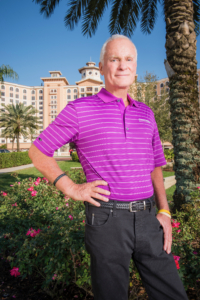
Harris Rosen at the Rosen Shingle Creek for Rosen Reveal, Photo by Roberto Gonzalez
From GrowingBolder
Harris Rosen: A Man on a Mission
“From humble beginnings, Harris Rosen has built one of the largest independently owned hotel groups in the country. But a hotelier is not what Rosen is; it’s simply what he does. Rosen is family man, an educator, a healthcare provider, a swimmer, a legendary philanthropist and a passionate advocate for civil rights and racial equality. And he’s issuing a challenge to other business leaders around the country — why aren’t you investing in your communities and in your people, too?”
https://growingbolder.com/stories/harris-rosen-a-man-on-a-mission/
Harris Rosen is President and COO of Rosen Hotels & Resorts, a hospitality company of nearly 50 years featuring an award-winning collection of seven Orlando-area hotels (three convention and four leisure) comprising close to 6,500 guestrooms and suites and 700,000 square feet of meeting and event space. With an unyielding, people-first focus, Rosen is a visionary leader in the hospitality, philanthropy and healthcare industries.
Growing up in New York’s Lower East Side in the 1940’s, nothing came easy for Harris Rosen. His family’s modest apartment still stands at 18 Monroe Street between the East River, the Bowery, Little Italy and Chinatown. After attending Music & Art High School in the Bronx, Harris Rosen applied to mostly fine arts colleges, but also Cornell University. He still marvels at the fact that he was accepted to Cornell and graduated four years later with a degree in hospitality management.
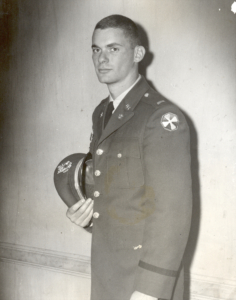 After graduating, Rosen then served in the Army for more than three years as an officer in Germany and South Korea.
After graduating, Rosen then served in the Army for more than three years as an officer in Germany and South Korea.
Rosen began his career in hospitality as a convention salesman at the Waldorf=Astoria in New York City and continued his rise with the Hilton Hotels Corporation holding various management roles in Pittsburgh, Buffalo, Cape Kennedy (FL) and Dallas.
Eventually, he landed in Orlando after taking a job with Disney, working on hotel designs and even creating its central reservation system. It was around that time when Rosen realized if he was going to be happy and fulfilled, he had to consider being in business for himself.
The early 1970’s was a tough time in the United States with a stock market in decline and an Arab oil embargo making gasoline scarce and costly. Hotels in Orlando struggled, mightily. That opened the door for Rosen as he took all his savings, some $20,000 dollars, and agreed to purchase a small, 256-room Quality Inn with a two-million-dollar mortgage on the property which he assumed during the purchase. There was no going back.
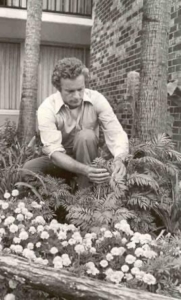 He did everything from cooking and cleaning to gardening and front desk. Rosen lived on property and even converted two rooms into an office and a tiny apartment with a small stove up against the wall.
He did everything from cooking and cleaning to gardening and front desk. Rosen lived on property and even converted two rooms into an office and a tiny apartment with a small stove up against the wall.
Today, Rosen remains in that same office in what is now the Rosen Inn International. His success allowed him to purchase two other hotels which are now the Rosen Inn closest to Universal and Rosen Inn Lake Buena Vista and build the Rosen Inn Pointe Orlando, Rosen Plaza, Rosen Centre and the crown jewel of the collection, Rosen Shingle Creek. His success in the hospitality field is legendary, only matched by his success as a philanthropist and humanitarian.

Harris Rosen, Shingle Creek; Rosen Centre; Rosen Plaza, photo by Roberto Gonzalez
Rosen is a pioneering philanthropist for education. In 1993, Rosen created the Tangelo Park Program which has provided free preschools for all 2-, 3-, and 4-year-olds who live in the underserved Tangelo Park neighborhood in Central Florida.
All the neighborhood children who graduate from high school and are accepted to a trade school, community college or four-year public college or university in Florida are provided with scholarships that include tuition, books and room-and-board—paid for by Rosen’s foundations. To date, more than 200 Tangelo Park youths have received full college scholarships.
In 2016, Rosen’s passion for providing hope through education led him to embark on a second similar program in the Parramore neighborhood, an urban community located near downtown Orlando that is five times the size of Tangelo Park. Rosen provides the same post-high school education opportunities as he does for Tangelo Park children. In addition, he funds the Rosen Preschool at the Orange County Public Schools Academic Center for Excellence. His hope through both initiatives is to change America one community at a time.
He has also been a major supporter of the University of Central Florida and made a major financial donation in 2002 to develop the Rosen College of Hospitality Management, which is currently the top-rated hospitality college in the nation and ranked second in the world.
Rosen and The Harris Rosen Foundation also made a $12 million gift to advance innovative brain tumor immunotherapy research and care at UF Health and to launch an unprecedented partnership for the development of novel brain tumor treatments. The Rosen gift is the cornerstone of a $100 million fundraising commitment led by the University of Florida to support the ReMission Alliance Against Brain Tumors, a groundbreaking, collaborative initiative that will unite world-leading neuro-oncology physicians and scientists in dynamic research and clinical trials.
The gift was announced Friday, Feb. 22, 2019, before the inaugural ReMission Summit for Brain Tumors at the Rosen Shingle Creek Hotel in Orlando. The UF-organized Summit brought together more than 100 experts in neuro-oncology, tumor immunology, genetics, artificial intelligence, neuroimaging and bioinformatics to form an elite research community focused on achieving transformative outcomes for patients with brain tumors over the next decade. The ReMission Summit also served as the public forum for the debut of the ReMission Alliance.
This collaborative strategy for brain tumor research resonates deeply with Rosen. His son, Adam, died in November of 2018 at the age of 26 after a two-and-a-half-year fight with brain cancer. Throughout his own struggle with the disease, Adam remained committed to helping others and raising money for Orlando-area families of children fighting cancer.
Rosen’s support of UF’s work with the ReMission Alliance builds on his longtime commitment to healthcare.
In 1993, he established an in-house healthcare program that included a medical center to provide access to personalized care for his associates. His revolutionary view of the healthcare system provided the foundation for RosenCare, which keeps comprehensive care costs down, while providing insurance coverage rich in benefits for his associates. To date, his organization has saved close to $500 million in costs.
He also established the 12,000-square-foot Rosen Medical Center, A Place for Healing and Wellness, in 2012, which includes a full offering of comprehensive primary and occupational care services. In recognition of his achievements, Rosen was honored in 2018 by the World Health Care Congress with two Lifetime Achievement Diamond Awards in Health Benefits Innovation and Public Leadership.
 Rosen has received numerous awards and recognitions during his lifetime of service and philanthropy. In 2022, Rosen received Leadership Florida’s highest honor, the LeRoy Collins Lifetime Achievement Award for his efforts to improve the lives of all Floridians. He also received the United Negro College Fund’s Community Champion of Education Award for his efforts in Tangelo Park and Parramore.
Rosen has received numerous awards and recognitions during his lifetime of service and philanthropy. In 2022, Rosen received Leadership Florida’s highest honor, the LeRoy Collins Lifetime Achievement Award for his efforts to improve the lives of all Floridians. He also received the United Negro College Fund’s Community Champion of Education Award for his efforts in Tangelo Park and Parramore.
 “Burton M. “Skip” Sack ’61 is partner and chairman of Classic Restaurant Concepts. He serves on the board of the National Restaurant Association, of which he is a past chairman. Sack began his career in the restaurant industry at the age of 13 as a dishwasher for Howard Johnson’s. At 17 he joined the U.S. Marine Corps and rose to the rank of sergeant. Immediately upon his discharge three years later, he enrolled in Cornell University’s School of Hotel Administration. Following his graduation in 1961, Sack joined the Howard Johnson’s as an advertising assistant and soon became assistant director of marketing and vice president of public relations.
“Burton M. “Skip” Sack ’61 is partner and chairman of Classic Restaurant Concepts. He serves on the board of the National Restaurant Association, of which he is a past chairman. Sack began his career in the restaurant industry at the age of 13 as a dishwasher for Howard Johnson’s. At 17 he joined the U.S. Marine Corps and rose to the rank of sergeant. Immediately upon his discharge three years later, he enrolled in Cornell University’s School of Hotel Administration. Following his graduation in 1961, Sack joined the Howard Johnson’s as an advertising assistant and soon became assistant director of marketing and vice president of public relations.
 In 1984, Sack became the second franchisee of Applebee’s, acquiring the right to develop the New England territory. At the time, Applebee’s had only two restaurants. His first restaurant opened in 1986, and by 1994 he had 16 restaurants operating in four New England states that employed more than 1,300 people. That year he sold his restaurant operations to Applebee’s International and continued to work as executive vice president. He served as a member of its Board of Directors until 2007 when the company was sold.
In 1984, Sack became the second franchisee of Applebee’s, acquiring the right to develop the New England territory. At the time, Applebee’s had only two restaurants. His first restaurant opened in 1986, and by 1994 he had 16 restaurants operating in four New England states that employed more than 1,300 people. That year he sold his restaurant operations to Applebee’s International and continued to work as executive vice president. He served as a member of its Board of Directors until 2007 when the company was sold.
Sack has privately invested in more than 50 startup companies and serves on the boards of Tibersoft Corporation, Tempra Technologies, Evolucia Lighting, and Cambryn Biologics. He is a founding member of the Marine Corps Heritage Museum, a member of the Board of Governors of the Marine Corps Association, and a trustee of the Marine Corps Association Foundation.
Sack is a former president of the Cornell Hotel Society. In 2011, he was recognized as Cornell Hotel Society Southeast Regional Hotelie of the Year. He has served as a member of the School of Hotel Administration Dean’s Advisory Board and is a life member of Cornell University Council. Sack and his wife Gail live in Longboat Key, Florida and spend the summers on Cape Cod.”
Cornell Nolan School of Hotel Administration.
Now in his own words,
“In 1958, the application packet for Cornell required a Letter of reference be sent directly to the admissions office in a supplied, stamped, self-addressed envelope. I asked my former supervisor at Howard Johnson’s (Bill Pendergast – VP Northeast Region) if he would write a letter, and he consented. Three weeks after starting School, Dean Meek saw me in the hallway and said: “Mr. Sack, I’d like to see you in my office.” When I went into the Dean’s office, he asked me if I knew why I was accepted at Cornell. I replied that I didn’t know. He said it was because of a wonderful letter of reference he had received from Mr. Howard Johnson. I said, “You mean Mr Pendergast from Howard Johnson’s?” He said “No. From Mr Howard D Johnson.” Evidently, Pendergast wrote a glowing letter of reference, but then gave it to Howard Johnson to have typed on his stationary and signed by him. Dean Meek said he was so impressed that Howard Johnson would take the time to write a letter of reference, he just had to accept me. Truth be known, I was a solid “C” student in High School. What also helped, I believe, was that during the 18 months I spent in Japan, I attended the University of Maryland Extension Courses on the base, taught by University Professors. I also completed several correspondence courses from the U.S. Armed Forces Institute.
The first day I was in Professor Beck’s Accounting Class, he proudly proclaimed that he was the only Professor at Cornell to hold up his sox with a tack.
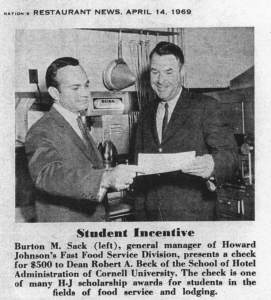 I received my notice of acceptance from Cornell, the day before I was discharged. I had planned to leave the base at 6:00 AM, so the afternoon before, I went to the Post Office and gave them my change of address. The Postmaster checked my box and handed me the letter which arrived that afternoon. Had the letter came one day later, I would never have gone to Cornell. It would have taken 3 weeks for the letter to reach me, and the acceptance letter said the Spring Semester started in 6 days. Since then, I’ve been a firm believer in fate.
I received my notice of acceptance from Cornell, the day before I was discharged. I had planned to leave the base at 6:00 AM, so the afternoon before, I went to the Post Office and gave them my change of address. The Postmaster checked my box and handed me the letter which arrived that afternoon. Had the letter came one day later, I would never have gone to Cornell. It would have taken 3 weeks for the letter to reach me, and the acceptance letter said the Spring Semester started in 6 days. Since then, I’ve been a firm believer in fate.
 Another example of fate. In February 1958, there was a major recession in America. Jobs were hard to come by. I needed a job to pay my way through school, so I applied for every position that was advertised on the job bulletin board at Day Hall. One of those positions was for a Campus Police Officer, and I applied for that as well. I received a call from the Cornell Chief of Police at the time, Chief McCarthy, who asked me to come into his office for an interview. During the interview he mentioned that I had put down the name of Colonel Bowker as my last employment supervisor. (Colonel Bowker was my Battalion Commander, but as a lowly Sergeant, I had never met him.) Chief McCarthy asked me if I knew that Colonel Bowker had been at Cornell a few years prior, in charge of the PLC Program (That’s the Marine version of ROTC.) I told him I didn’t know that. He asked me if I knew that he and Colonel Bowker were the best of friends. I told him I didn’t know that either. He then said that any friend of Colonel Bowker’s was a friend of his, and that’s how I became the only student at Cornell to work full-time for the Campus Police. In April of 1958, I had the honor, along with another officer, of driving former President Truman during his 3-day visit to Cornell. President Truman lectured at Bailey Hall, had dinners with Cornell President Dean Mallott, lunches with the faculty and spoke in various classes.
Another example of fate. In February 1958, there was a major recession in America. Jobs were hard to come by. I needed a job to pay my way through school, so I applied for every position that was advertised on the job bulletin board at Day Hall. One of those positions was for a Campus Police Officer, and I applied for that as well. I received a call from the Cornell Chief of Police at the time, Chief McCarthy, who asked me to come into his office for an interview. During the interview he mentioned that I had put down the name of Colonel Bowker as my last employment supervisor. (Colonel Bowker was my Battalion Commander, but as a lowly Sergeant, I had never met him.) Chief McCarthy asked me if I knew that Colonel Bowker had been at Cornell a few years prior, in charge of the PLC Program (That’s the Marine version of ROTC.) I told him I didn’t know that. He asked me if I knew that he and Colonel Bowker were the best of friends. I told him I didn’t know that either. He then said that any friend of Colonel Bowker’s was a friend of his, and that’s how I became the only student at Cornell to work full-time for the Campus Police. In April of 1958, I had the honor, along with another officer, of driving former President Truman during his 3-day visit to Cornell. President Truman lectured at Bailey Hall, had dinners with Cornell President Dean Mallott, lunches with the faculty and spoke in various classes.
President Truman eschewed the Secret Service after leaving the White House, and I had the privilege of driving him for the 3 days he was at Cornell. The last night he was at Cornell, he invited the other officer and me, up to his room for a drink, which was an experience I will never forget.
My roommate at School, for 2 and a half years, was Dick Ferris who later became my business partner in the New England Applebee’s franchise.
One of the first people I met at Cornell in 1958, was Tom Pedulla (’60), who had just gotten out of the Air Force. Tom and I became the best of friends for over 60 years.
I graduated in three and a half years because I was working full-time, including summers, so I took courses during the summer for extra credit.
 In 2003, Dean Butler asked me to give the Hotel School Commencement Address at Barton Hall.
In 2003, Dean Butler asked me to give the Hotel School Commencement Address at Barton Hall.
I have lectured in over 40 classes at Cornell over a 60-year period. On 5 different occasions, I was the Friday afternoon speaker at what used to be Class #155: then Brownies with Beck, Cookies with Clark, Donuts with Dittman, etc. “
An interview with Skip from Business Observer magazine July 30th, 2004, by Sean Roth
Welcome to Skip Sack’s Neighborhood
Burton ‘Skip’ Sack made his Applebee’s neighborhood restaurants one of the chain’s most successful franchises.
Now he’s bringing his recipe to the National Restaurant Association.
https://www.businessobserverfl.com/news/2004/jul/30/welcome-skip-sacks-neighborhood/
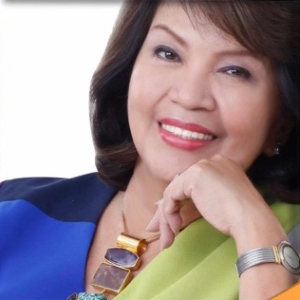 When Ted Teng ’79, Chairperson of the Cornell Hotelie Hall of Fame Committee, and two of its members, Kristin Sander Urhammer ’99 and Carla Petzold-Beck ’95, approached her at a Cornell Hotel Society event in Amsterdam this year, Annabella Wisniewski got the surprise of her life.
When Ted Teng ’79, Chairperson of the Cornell Hotelie Hall of Fame Committee, and two of its members, Kristin Sander Urhammer ’99 and Carla Petzold-Beck ’95, approached her at a Cornell Hotel Society event in Amsterdam this year, Annabella Wisniewski got the surprise of her life.
“You have been selected as one of the inductees for this year,” Ted told her.
Was it her turn as the token female, or token Asian, or token something for the Hall of Fame? She was truly in awe, but could joke with Ted about it, with the prejudices of the past comfortably behind her.
As soon as she was alone, in suitable quietude, she found herself looking back across a journey of 60 years.
Annabel, as she has come to be more widely and familiarly known, was born into the restaurant and hotel business. Her mother, Honorata Fajardo, owned and ran Bungalow Food Services, the largest restaurant company in the Philippine industry in the 1950s. Naturally, her mom would have none of her teenage dream of becoming an architect, like her father.
“You should go into business; then you can support a hobby like architecture,” she said, and proceeded to command Annabel: “Go to the best hotel school there is. Go to Cornell.”
Within months, her mom and friends were hosting H. B. Meek, the founding dean of Cornell’s School of Hotel Administration, in Manila. Once she heard Dean Meek’s spiel on Cornell, Annabel was sold and obediently on her way to Ithaca.
“At Cornell,” Annabel recalls, “we had to be serious to make it. Entrepreneurship is genderless. It’s the passion for excellence that distinguishes oneself, coupled with the drive, motivation, confidence, and courage to take risks.” In her Cornell class, 92 percent of students were male.
After graduating from the Hotel School in 1965, Annabel knew she had to come home – it was the unspoken deal, but she stalled and got a job in Hawaii at the Kahala Hilton. The taste of independence had her yearning for more but, without financial independence, home beckoned.
Once back in the Philippines, Annabel was eager to share what she had learned with those who lacked the privilege of that education. She suggested that the Hotel and Restaurant Association of the Philippines invite Cornell professors to provide seminars in the summers. And they came, led by Dean Robert Beck, for three consecutive years. It was the first major exposure of local hoteliers and restaurateurs to international educators in the hospitality industry, and it led to the expansion of the Hotel and Restaurant Department of the University of the Philippines and further to the creation of the Asian Institute of Tourism in that University.
Not long after returning home, however, Annabel felt she needed more experience and more freedom. On the pretext of having to go to New York to formalize her resignation from Hilton, she asked her mother for plane fare. Her mom was not fooled, but gave her the money all the same, thinking Annabel deserved some rest before plunging herself into the family business.
But New York had a job for her, at the Waldorf Astoria, and she was convinced to stay. A student visa for graduate studies at the Hotel School provided a quick solution to arranging a legal stay. She called her mom again for the necessary resources. “She replied by practically disowning me!”
 With Professor Gerald Lattin’s help Annabel took a variety of jobs on campus — teaching assistantships, working at the Statler Hotel, and resident assistant at Mary Donlon Hall, thus supporting her own stay. During her graduate studies she met Tom Wisniewski ’71, a tall, handsome Marine who had just returned from Vietnam.
With Professor Gerald Lattin’s help Annabel took a variety of jobs on campus — teaching assistantships, working at the Statler Hotel, and resident assistant at Mary Donlon Hall, thus supporting her own stay. During her graduate studies she met Tom Wisniewski ’71, a tall, handsome Marine who had just returned from Vietnam.
Scarcely reconciled with her mother, Annabel rang her to share the news that she was marrying Tom. In keeping with Philippine tradition, the whole family flew to Ithaca for the wedding. Six months later the couple visited Manila, and Tom liked it enough to stay for 11 years and, with Annabel, help her mom manage her business, expanding it rapidly.
While in Manila she and Tom also started their own hospitality consulting firm with major clients like Philippine Airlines, Orchard Hotels, Ascott, and the Manila Polo Club. But Martial Law was proclaimed in the Philippines and finding the business environment too suffocating, Tom and Annabel, now with three boys, moved to San Francisco where she joined the Pacific Area Travel Association as Director of Development.
The entrepreneurial urge, however, was simply too strong to contain and they developed, with a partner, the 95-room Orchard boutique hotel in San Francisco along with a critically acclaimed French restaurant, Annabel’s. As many Bay Area hotels were still recovering from the early 1980’s recession, they formed a company to rescue distressed hotels.

Pictured: Jan-Willen den Ridder ’80, Annabella Wisniewski ’65, Jeanne Sander ’66
An industry colleague, hotelie classmate, and CHS past president, Jeanne Brown Sander ’66, sees the revolutionary in Annabel. “The trend in the hotel business in the ’60s and ’70s was to forget about planning to own and run your own and to join a big chain. That, after all, was where the money was made, but that was not Annabel.”
After 12 years of successes as a rescuer, Annabel took up an offer from Singapore, in 1994, to sit as the first woman director of Ascott International LTD, charged with presiding over its International Hospitality Division. Tom remained in San Francisco, holding the fort for their American businesses, and, from separate locations, they watched over their three sons, away in other states for school – with middle son Andrej ’94 at the Hotel School at Cornell.
 At the painful cost of separation, Annabel was opening luxury properties for Ascott in Singapore, Kuala Lumpur, Jakarta, and London. She introduced the first luxury long-stay lodging with full hotel services in Singapore to an unserved international corporate market. Asked to open one in the Philippines, the serendipitous assignment provoked what would turn out to be a prescient thought, Why am I doing all this for someone else when I could be doing it for myself and for my own country?
At the painful cost of separation, Annabel was opening luxury properties for Ascott in Singapore, Kuala Lumpur, Jakarta, and London. She introduced the first luxury long-stay lodging with full hotel services in Singapore to an unserved international corporate market. Asked to open one in the Philippines, the serendipitous assignment provoked what would turn out to be a prescient thought, Why am I doing all this for someone else when I could be doing it for myself and for my own country?
The Wisniewskis came home to Manila in 1996 and set up Raintree Management Partners. Through the Asian financial crisis of 1997, the Wisniewskis kept their company going with projects capitalized by companies that could afford the risks. In 1999, they bought out their partner and started a new hotel and restaurant company with three employees. Today, its workforce has grown to just under one thousand.
“I didn’t really envision anything big. We had already done enough to be proud of ourselves and set in our lives. I wanted to give something back, help raise the standards for the local industry, and showcase a new kind of management,” Annabel says.
Raintree created, in the atrium of one Manilla’s best-situated office buildings, its first Foodpark—a sprawling food hall with small restaurants, food vendors, and shops. And upon learning the historic Ayala Museum was building a new museum with a café, Annabel remarked, “Don’t tell me it’s going to be another of those teahouses for little old ladies!” Instead, they selected her concept of what became M Café, and on its success, Raintree has expanded the Foodparks and restaurant company to 12 brands in 30 locations around the Philippines.
Alongside Raintree, Annabel and her hotel partner created Discovery Suites, a successful serviced apartment hotel in Manila as well as Discovery Shores, the first luxury resort on the Island of Boracay, when local resorts were all two and three-star levels. Soon, international luxury hotels were sprouting and tourism booming. The company opened resorts in typhoon devastated and impoverished provincial locations, detecting a strong potential for tourism. These properties set new standards, employing hundreds of local workers, engaging native suppliers, and boosting local economies.
Bobby Horrigan, GM at Discovery Hotels when Annabel was president and CEO, refers to her as a “living legend” in the industry. Discovery, the first Filipino luxury hotel group, is now a brand, taking awards from Tatler, Travel & Leisure, and Conde Nast Traveller, among other publications.
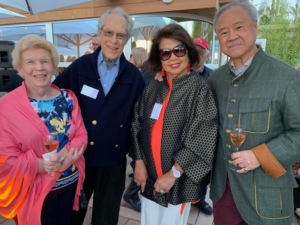
Pictured: Jeanne Sander ’66, Leif Evensen’66, Annabella Wisniewski ’65, Michael Chiu ’66
Raintree continues to evolve, and Annabel continues to be fully involved, opening new concepts following the Covid pandemic including two new country garden restaurants, Farmer’s Table and My Country House. Albert Alcantara, Raintree’s Director for Finance and a member of the executive committee, sees Annabel as “a visionary leader who, with her strong presence and guidance, has the remarkable ability to influence, inspire, and motivate employees whether as individuals or as teams.” “But it’s her compassionate nature that shines through. She bets strongly on native Filipino traits – warm and welcoming. Given the appropriate education, training, and motivation, Filipinos, she hasn’t the slightest doubt, make great hotel and restaurant managers.”
“At Raintree,” Annabel herself says, “we work very hard to create a strong sense of place. I don’t want to be waking up in a beautiful patch of property and not know that I’m in Bali or Phuket or Singapore. Whether it’s Misibis Bay or in Baler or on Boracay Island or in Tagaytay, the resorts and restaurants should take in the best of the character of the place, the best view and ambiance, the best local hires. It must unmistakably exude that local sense of community.”
Annabel is pleased the next generation of managers, including two of her sons, is stepping up to take on the reins. Her one regret is that Tom cannot be at her acceptance of the Hall of Fame honor – he passed on in 2018. “If only Tom were still here,” she is in fact heard to say all too often. Annabel and Tom had always been a team, navigating the roughest waters and pulling it off together – through consulting deals with international hotel companies, through the pioneering Discovery Suites, and through Raintree. In 1998, for Discovery Suites, they received the Best Employer Award from Hewitt Associates and the Wall Street Journal. Their Boracay Discovery Shores was judged in 2010 as one of the top 15 family hotels in Asia.
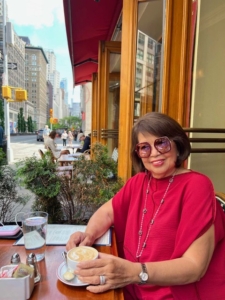 Annabel can rest on her laurels now – a finalist for Ernst & Young Philippines’ Entrepreneur of the Year, one of the “1I Bossings in the Philippines,” a PLDT-Smart prize for business leadership, and one of the top 55 Philippine entrepreneurs named by the Philippine Center for Entrepreneurship Foundation.
Annabel can rest on her laurels now – a finalist for Ernst & Young Philippines’ Entrepreneur of the Year, one of the “1I Bossings in the Philippines,” a PLDT-Smart prize for business leadership, and one of the top 55 Philippine entrepreneurs named by the Philippine Center for Entrepreneurship Foundation.
Her advice to those who may want to follow her path: “Success takes believing – in yourself and in your dreams. Stay passionate, persevere, and pray a lot. Don’t forget that in the end it’s all beyond profit, outside your balance sheet. It’s about family, country, and the difference you have made in the lives of others.”
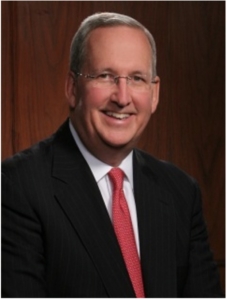 Steve’s professional life is defined as being the hotel valuation expert. His great contribution is to establish hotels as a financial asset that can be valued and understood in the context of other real estate investments. His support of Cornell and Cornell’s Hotel School has been unwavering since his graduation in 1967. At Cornell, Steve established a chaired professorship in “Hotel Finance and Real Estate”, participated in numerous speaking engagements in the classroom, taught extensive in the Hotel School’s executive programs and served on advisory committees, both at the Hotel School and at Cornell University.
Steve’s professional life is defined as being the hotel valuation expert. His great contribution is to establish hotels as a financial asset that can be valued and understood in the context of other real estate investments. His support of Cornell and Cornell’s Hotel School has been unwavering since his graduation in 1967. At Cornell, Steve established a chaired professorship in “Hotel Finance and Real Estate”, participated in numerous speaking engagements in the classroom, taught extensive in the Hotel School’s executive programs and served on advisory committees, both at the Hotel School and at Cornell University.
_______
Jan deRoos ’78 occupied Cornell Hotel School’s HVS Chair from 2000 through his retirement in 2019. He offers the following thoughts as a tribute to Steve: “I first met Steve on one of his many trips to Cornell to teach in the Hotel School’s executive education programs. We instantly found a bond in our love for the minutiae of valuation and trying to “get it right”. I had the honor of working with Steve in the classroom and as a co-author.
 In over three decades of working with Steve, I came to admire his great generosity. He grew his global platform by being generous and partnering with others. He was generous with his time and empowered others to be successful both within the firm and as “HVS alumni”, having worked for the firm at some point in their careers. I am the personal recipient of Steve’s generosity to Cornell, for that I am forever grateful. Steve is generous with his time, relentlessly traveling the world giving the “Hotel Valuation Seminar” to thousands of interested students.”
In over three decades of working with Steve, I came to admire his great generosity. He grew his global platform by being generous and partnering with others. He was generous with his time and empowered others to be successful both within the firm and as “HVS alumni”, having worked for the firm at some point in their careers. I am the personal recipient of Steve’s generosity to Cornell, for that I am forever grateful. Steve is generous with his time, relentlessly traveling the world giving the “Hotel Valuation Seminar” to thousands of interested students.”
Rod Clough ’94, President of HVS Americas offers this tribute: “On behalf of all of us here at HVS, I congratulate Steve on this most deserving honor. Steve built an impressive foundation here at HVS that hundreds of us continue to build upon – for both our present team and for those that have moved on from the firm. Through many partnerships and alliances, he built a worldwide consulting organization where entrepreneurs could thrive. He hired brilliant minds to collectively build this extraordinary hospitality consulting organization and where they could all become industry’s valuation thought leadership. He then married this with an equity sharing structure where these minds would then stay. A culture that allowed both independent thought and collaborative thought to thrive was created; Steve ultimately created a very special place here, which continues to this day. His principles and brilliance still guide what and how we go about our work. Not surprisingly, alumni of HVS have risen to leadership positions throughout the industry, including most of the nation’s consulting firms, and they continue to reflect Steve’s foundational principles in their work.
Beyond HVS, Steve’s dedication to the hotel industry was far reaching. He spent countless hours teaching classes to industry professionals and students. Steve’s textbooks and articles are highly regarded in the industry and represent the gold standard in valuation and consulting. He was also a star in the courtroom, often serving as a sought-after expert in high profile cases. Steve’s involvement in industry committees, conference advisory boards, and speaking engagements was extensive. Looking back on Steve’s career and his contribution to the industry is just simply extraordinary. It is inspirational and we here at HVS are grateful for everything he did to make this a special practice area to work in.”
_______
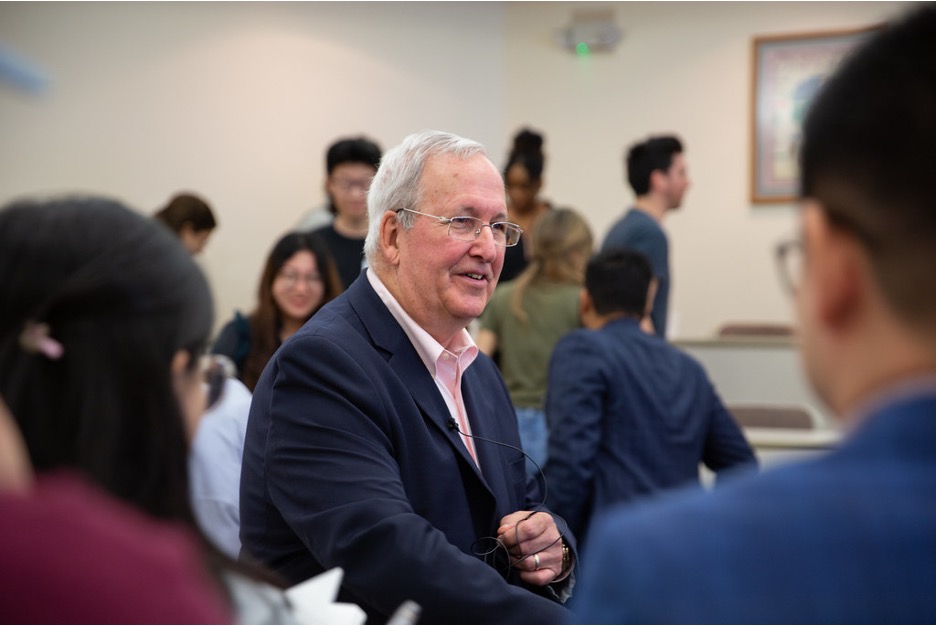
Russell Kett is Chairman of the HVS London Office and has asked that we include the following:
STEVE RUSHMORE
By the time I first met Steve Rushmore ‘in the flesh’, as opposed to watching him from the audience making keynote presentations at hotel investment conferences, it was January 1995 and he was already considered a hotel valuation ‘guru’. At this time we found ourselves speaking at the same conference in Lisbon, Portugal, when I was working out my notice at Deloitte having been hired to join the London office of HVS which I did later that month.
What struck me most about Steve at that first meeting was how he chose to teach complex issues in a gloriously simplified way, something which I hope I have been able to copy in my own life – imitation being the sincerest form of flattery.
Steve had instilled an ethos within HVS from its inception which was partly my reason for joining in the first place but it has certainly been the reason for me staying for what is now nearly 30 years. That ethos was founded on the utmost integrity and a recognition that a successful consulting business relies on being client-driven on the one hand and people-focused on the other. Without having well-trained, enthusiastic and talented people to deliver the services, clients have no justification to commission the firm – and especially not to return time and time again as so many do.
Hiring the brightest and the best people available has long been a hallmark of Steve and HVS and, whilst many joiners have gone on to occupy senior positions within the firm, many of those who have left HVS have moved to senior positions within the hotel sector and gained significant reputations on the back of their HVS experience. Steve was quick to realise that having HVS on your resume was well-recognised by other employers and an outstanding cadre of alumni has been accumulated over the years, who are the cause of immense pride to their previous employers.
Steve also pioneered the recruitment and advancement of women and diversity more generally, along with encouraging both flexible working practices and rewarding associates in line with their performance and achievements, without the need for any external encouragement and well before most other entrepreneurs recognised the importance of these trends.
Finally, despite Steve’s achievement to be recognised as the guru of hotel valuation – and writing the book on the subject has done no harm to cement his reputation – Steve remains utterly modest in his demeanour, encouraging his colleagues around the world to develop their own reputations in this field, albeit whilst ‘riding on his coat tails’. I take immense pride in supporting Steve’s nomination for the Hotelie Hall of Fame and can only express surprise that it has taken so long for him to be so recognised.
_________
A summary of Steve’s accomplishments:
Steve Rushmore, MAI, CHA is the Founder of HVS- a global hotel consulting organization with more than 50 offices around the world. He has provided consultation services for more than 15,000 hotels during his 50-year career and specializes in complex issues involving hotel feasibility, valuation, and financing. He was one of the creators of the Microtel concept and was instrumental in its IPO. Steve is a partner in HEI Hospitality, LLC, a hotel investment fund.
As a leading authority and prolific author on the topic of hotel feasibility studies and appraisals, Steve has written all five textbooks and two seminars for the Appraisal Institute covering this subject. He has also authored three reference books on hotel investing and has published more than 300 articles. Steve developed Hotel Market Analysis & Valuation Software which is used by HVS and thousands of hotel consultants, owners, and lenders throughout the world. Steve is truly the Creator of the Hotel Valuation Methodology.
Steve lectures extensively on hotel trends and has taught hundreds of classes and seminars to more than 20,000 industry professionals. He is also a frequent lecturer at major hotel schools and universities around the world including Cornell, Glion, Hong Kong Polytechnic, EHL, Florida International University, IMHI, Michigan State, Penn State, Houston, NYU and the Harvard Business School.
Steve is the Chairman of the International Advisory Board at Hong Kong Polytechnic University, and a Member of the International Advisory Board at EHL Hospitality Business School as well as a past trustee at the Culinary Institute of America. During his 50-year career, Steve has been on the Boards and provided guidance for many hotel schools including- Cornell, Michigan State, Penn State, NYU, University of Houston, Florida International University, and Johnson and Wales.
Link to Steve’s Home Page: Steve Rushmore- Creator of the Hotel Valuation Methodology
____________
Prepared September 12, 2023 by Jan deRoos ’78; many thanks to his colleagues for their tributes.
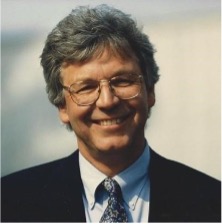 Jim’s life journey is the gold standard for human beings who inspired others. He was a life-long learner who was always seeking a better way forward, a gentle mentor to all who wanted to impact others by lifting their aspirations, an educator who taught the next generations of leaders how to lead in hospitality and related industries as well as in society.
Jim’s life journey is the gold standard for human beings who inspired others. He was a life-long learner who was always seeking a better way forward, a gentle mentor to all who wanted to impact others by lifting their aspirations, an educator who taught the next generations of leaders how to lead in hospitality and related industries as well as in society.
While these three characteristics are separately found in others, Jim embodied all three simultaneously as he fulfilled his life’s purpose. The following information and stories from professional colleagues remind those of us who knew about his endearing and powerful sense of humanity.
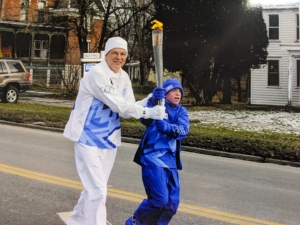 Jim retired in 1999 but continued to keep in touch with his students. They returned the favor by nominating him to carry the 2002 Olympic Torch through Seneca Falls, New York, on Dec. 31, 2001, on the way to the Olympics in Utah.
Jim retired in 1999 but continued to keep in touch with his students. They returned the favor by nominating him to carry the 2002 Olympic Torch through Seneca Falls, New York, on Dec. 31, 2001, on the way to the Olympics in Utah.
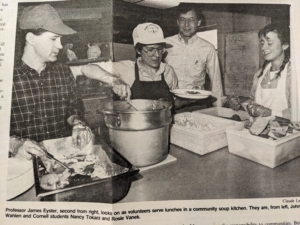
Jim’s wide-ranging influence has been felt as he fulfilled his life’s purpose. Jim taught courses in financial management and real estate. He followed politics closely and was very concerned about the social and political injustices of the world as well as with human pain and suffering. To make a difference, he courageously initiated the course entitled Housing and Feeding the Homeless. He received a Chaired Professorship, the HVS Professor of Hotel Finance and Real Estate and became a Professor Emeritus at the Hotel School upon his retirement. His Ph.D. centered on a study of hotel management contracts and evolved into worldwide consulting work, and he was sought after by many of the leading hotel owners and management companies. His book, “The Negotiation and Administration of Hotel and Restaurant Management Contracts,” has become the go-to book for the industry. His consulting work led to a longstanding relationship with the United States National Park Service, which held a special place in Professor Eyster’s heart. He loved nature and the outdoors. He served as the chair for ten years of the National Park Service’s Concessions Management Advisory Board.
One of the gems from Jim’s Cornell Archive is the following, entitled “All Anyone Needs to Know About Finance, Ever”.
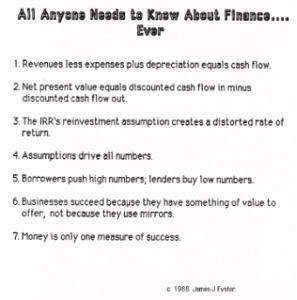
A Cornell faculty member since 1972, Eyster is credited with creating an entirely new area of study – with his exploration and analysis of hotel management contracts – then writing the authoritative book on the subject.
Jan A. de Roos ’78, who collaborated with Eyster on the fourth edition of that book, “The Negotiation and Administration of Hotel Management Contracts,” calls Eyster “the intellectual father of hospitality real estate management.” De Roos, SHA associate professor and the HVS Professor of Hotel Finance and Real Estate, said, “Jim Eyster was known for his warmth and integrity,” adding, “He always took the high ground.”
Glenn Withiam, executive editor of the Cornell Hospitality Quarterly explained that by the 1960s hotel management contracts between property owners and management companies were becoming “remarkably complex and detailed, and Professor Eyster realized the importance of compiling and analyzing their diverse terms.”
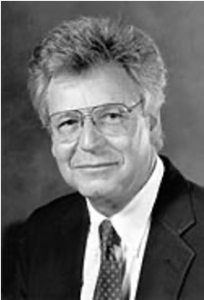
Withiam pointed to Eyster’s “astonishing accomplishment of persuading several hundred hotel owners, operators, financial partners and consultants to share the terms of their management contracts, as well as their experiences with and concerns about those contracts.
“This was no mean feat in an industry as competitive as the hotel business,” Withiam said. “The fact that they were willing to provide this information to Professor Eyster demonstrates the trust he earned from his contacts, and the fact that this book continues in print testifies to the importance of this research.” The book was first published in 1977 by the School of Hotel Administration, with subsequent editions in 1980, 1988 and 2009.
One of Professor Eyster’s long standing colleagues, Professor Emeritus Neal Geller ’64 says: “The best thing I can say for Jim’s tribute statement is that he was a consummate Cornellian—as a student, graduate student, and faculty member. As a faculty member, he was demanding yet caring for his students. Their love for him showed. As a colleague, he was caring, supportive, and wonderful to work with. As a friend, he was caring, concerned, and incredibly reliable. I will miss him greatly.”
Another long-term colleague, Professor Emeritus Michael Redlin says: “I remember Jim as a principled and caring man. He lived his principles throughout his life by such activities as being a Boy Scout leader to his son, Jamie, and other young men and creating at SHA the innovative course “Housing and Feeding the Homeless.” This course was renowned for applying the tenets of hospitality to a nationally important cause. He cared about his students because he knew the importance of them having significant impacts on their generation. He maintained an extensive and active network of past students with whom he shared his wisdom and passion for life. He will be missed by many spread far and wide around the world.”
Ann Hales, N.P., Ph.D., who co-taught with Jim for many years, remembers him as a mentor and colleague. At the top of Jim Eyster’s overwhelming number of achievements and his admirable character traits were his commitment to excellence and his dedication to helping others also achieve success and excellence. I worked in academia for over 30 years, and I saw no other person dedicate himself or herself to the success of others as much as Jim did. He made certain that others received first credit for scholarly work that he had completed with them. I was fortunate to have been a colleague of Jim’s during the height of the Housing and Feeding the Homeless Program in the School of Hotel Administration. It was my first academic position and Jim mentored me the entire way and made certain that I was the first author and received the first credit for all the academic work that we did. Jim was passionate about the Homeless Program and showed a heartfelt concern for colleagues, students, community leaders, and individuals struggling to obtain adequate food and housing. The Homeless Program was his creation, and his leadership was admirable and unprecedented. I am so proud to be able to say that Jim was my friend.
De Roos also remembered this prescient addition by Eyster to the School of Hotel Administration curriculum: a course on the housing and feeding of homeless people. Administrators and some faculty members of the nation’s pre-eminent hospitality education institution were a bit unsettled, at first, de Roos recalled, “but the students cherished that class and the man who taught it.”
He also recalls Jim’s impact on him. “Jim and I first met when I was a freshman at Cornell, in the fall of 1972. It was Jim’s “rookie” year, a freshly scrubbed assistant professor teaching accounting to a class who would become friends and colleagues for life. I “earned” a C in accounting, a tough course for me. But I did learn many important lessons in Jim’s course – both the mysteries of the “three statements” and how the numbers moved from one statement to another as well as the importance of thinking clearly and accurately.
Little did I know that first semester with Jim would be the spark for my academic career, following his advice as my master’s thesis advisor and then as chair on my PhD committee, where he continually challenged me to see the forest by coming to understand the role of each tree within the larger forest. I am indebted to Jim in many ways; as my teacher, as my mentor, as my co-author, as a trusted advisor, as an inspiration; but most importantly, I counted him as a friend.”
Professor Tadayuki Hara MPS ’91, PhD ’04, University of Central Florida and one of Jim’s former PhD students, recalls Jim’s impact in Japan and on him. Professor Jim Eyster is not only well-known in the USA, but also overseas. Different Japanese entities invited him to visit Japan multiple times, and while I was involved, he was invited to give lectures, seminars, speeches in different part of Japan. He talked about hotel management contracts, valuations of hotels, and general hotel management issues in cities including Tokyo, Osaka, Nagasaki, and Kofu.
“I took his course in 1989, and then became his teaching assistant for HA323, hotel valuation course in 1990 and 1991, in my second year of MPS. After completing my MPS I went back to Japan to work for a Japanese bank, while I served as executive secretary for the Cornell Hotel Society, basically service work for senior alumni, such as Mr. Ichiro Inumaru ’53 and Mr. Yuji Yamaguchi ’61.
I had multiple pleasures of taking care of SHA faculty in Japan, and naturally I took Professor Eyster out for meetings and sometimes for personal trips during off-duty days.
Once I took him to the mountainous part of Fukushima Prefecture, about 200 miles north of Tokyo. He was an early riser in the morning, so we walked along the small village of Nango. Suddenly there was a moment that he became exceptionally curious about a sound, which sounded like metal hitting something. “Tad, let’s walk to find out what the sound was”. After a few minutes, we saw villagers, mostly local tomatoes farmers, in perfectly fitting classic uniforms and playing baseball before 07:00am; the two teams started to line up at both sides of the home base in two lines, facing each other, then took off caps and bowed to each other at the end of the game. I saw the happiest facial expression of Professor Eyster, who had by chance discovered a baseball game in the middle of Fukushima.”
One of Jim’s unsung contributions is to all Americans, his service to the National Park Service. Kurt Rausch, Chief of the NPS Commercial Services Program says: “Dr. Eyster provided invaluable service to National Park Service. Between 2005 and 2014 he volunteered as member and chairman of the Congressionally authorized NPS Concessions Management Advisory Board. Jim uniquely combined his love of national parks and his expert industry knowledge to help the NPS make fundamental improvements in how they deliver hospitality and recreational services to hundreds of thousands of visitors each year. Under his chairmanship, the National Park Service streamlined and improved practices in areas ranging from contracting and leasehold surrender interest valuation to rate administration and performance standards and evaluation. The Board’s annual report to the Committee on Natural Resources of the House of Representatives and the Committee on Energy and Natural Resources of the Senate on its accomplishments was instrumental in demonstrating the National Park Service’s commitment to always improving for the U.S. public. Throughout his time of service to the NPS, Dr. Eyster embodied the spirt of Cornell University through his level of commitment, excellence, generousness of time and advice and his good nature. To this day, the National Park Service, its hospitality providers and its visitors benefit from Dr Eyster’s contributions to helping the NPS meet its mission to conserve, preserve and protect its most precious natural and cultural resources and provide enjoyment now and for future generations.”
Commenting on Jim’s contributions to the Hotel Industry, long time Marriott executive William “Bill” Minnock ’79, MBA ’83 says: “Jim’s cutting-edge work on management contracts and real estate development helped to guide the strategies of virtually all of the major hotel companies such as Marriott, Hilton, Hyatt, IHG, etc. for decades. Industry executives sought out and respected his insights and ultimately his work changed the structure of the hospitality industry, not just for the hotel companies but also for new sources of capital from REITs and Private Equity firms. His efforts clearly positioned Cornell Hotel School graduates as the leaders of both public and private hotel companies around the world.” Jim Butler, Chairman and Founder of JMBM’s global hospitality law practice says: “Jim Eyster was a wonderful, warm, caring human being with a great sense of humor who never took himself too seriously. It was always a pleasure to work with him on client challenges. He always made timely and insightful suggestions. He certainly “wrote the book” on hotel management agreements!”
Jim’s induction into the Cornell Hotel Society’s Hall of Fame is a tribute to the contribution he made to the lives of the many who he touched. My introductory story is but one “tree” in the “forest” of Jim’s devotion to making a difference in the lives of others. He inspired us all to embrace our better instincts and be intentional in improving both our own and other lives. He embraced the noble spirit of service to others as an act of kindness and grace, he walked the path of peace.
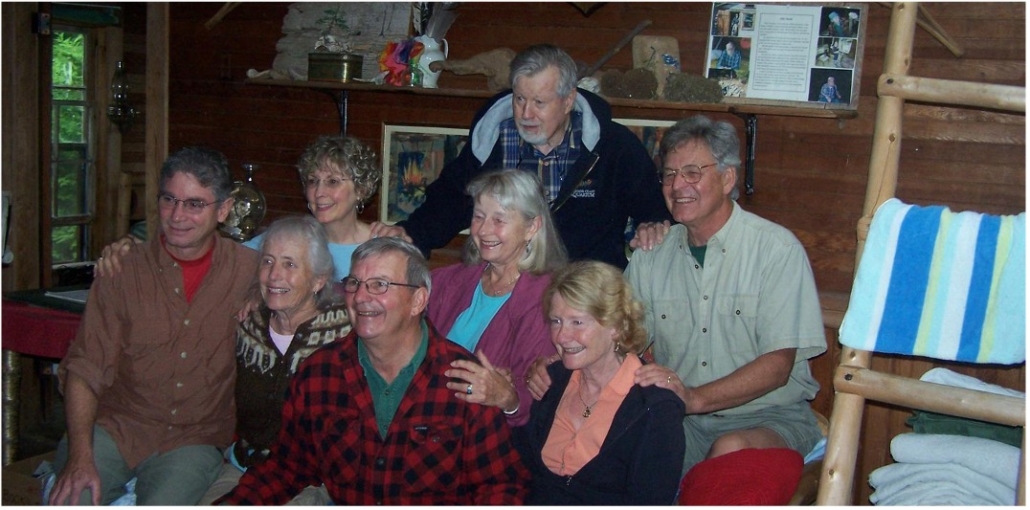
Jim inspired us all to be better, he is missed. May he rest in peace.
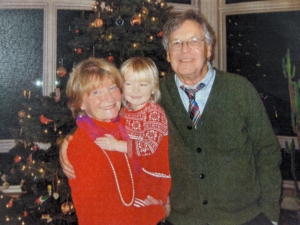


Link to Jim’s Obituary: James Eyster Obituary (2015) – Lansing, NY – Ithaca Journal (legacy.com)
____________
Prepared September 12, 2023 by Jan deRoos, Editing assistance from Michael Redlin
 After graduating Lee spent 19 years at Marriott, rising to become an Executive Vice President and Corporate Officer. Lee and his team introduced many innovations at Marriott including the first revenue management system for hotels, the first large scale guest loyalty program in the industry, developing Marriott’s multi-brand strategy and leading Marriott’s entry into the time share industry.
After graduating Lee spent 19 years at Marriott, rising to become an Executive Vice President and Corporate Officer. Lee and his team introduced many innovations at Marriott including the first revenue management system for hotels, the first large scale guest loyalty program in the industry, developing Marriott’s multi-brand strategy and leading Marriott’s entry into the time share industry.
Lee left Marriott in 1988 to launch Thayer Lodging Group, a hotel real estate private equity fund for institutional investors. Thayer Lodging Group sponsored six large equity funds, investing in hotels branded by Marriott, Hilton, Weston, Sheraton, Wyndham, and DoubleTree. During its 25+ years, Thayer Lodging’s funds achieved a 26.2% IRR, ranking it one of the most successful real estate funds. Its properties included the development of the Grand Lakes Resort in Orlando, renovation of the Ritz Carlton San Francisco, the renovation and conversion of Marriott Wardman Park in Washington DC and the renovation and conversion the Diplomat Hotel by Curio in Hollywood Florida as well as over 3 dozen other properties. The company was sold to Brookfield Asset Management in 2015.
Thayer Lodging Group launched several companies including TIG Global Internet Marketing that built the first website for hotels 2 years before Expedia. The company was bought by Micros Systems.
Thayer Insurance Group, built by Lee’s wife Mary dramatically cut the cost of property and casualty insurance and employee benefits for Thayer’s hotel portfolio, as well as many other hotel owners. The company was sold to its key executive in a leveraged buyout.
EMC Venues, developed to market meeting centers built in selected Thayer-owned hotels, was spun off to its key executive and now serves large corporations planning hundreds of meetings in hotels and conference centers nationwide.
PURE Rooms, enabling hotels to offer hypoallergenic guest rooms to travelers suffering from allergies, hay fever, COPD and asthma. Pure was bought by Ashford Hospitality.
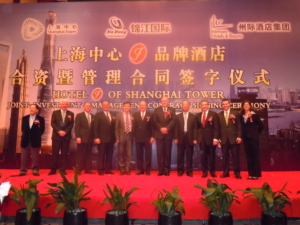 In 2004, Lee and Mary, with Teddy Zhang ’97 visited 18 of China’s provinces at the request of the Beijing Government to meet with local officials to promote the development of travel and tourism within China as a major employer and engine of economic growth. Thayer China formed a joint venture with China’s Jin Jiang Group to build the first central reservations/global distribution system running in Mandarin. In 2010, Thayer Lodging Group partnered with Jin Jiang to take Interstate Hotels and Resorts private, tripling the size of the company to manage over 500 hotels worldwide prior to its sale in 2015.
In 2004, Lee and Mary, with Teddy Zhang ’97 visited 18 of China’s provinces at the request of the Beijing Government to meet with local officials to promote the development of travel and tourism within China as a major employer and engine of economic growth. Thayer China formed a joint venture with China’s Jin Jiang Group to build the first central reservations/global distribution system running in Mandarin. In 2010, Thayer Lodging Group partnered with Jin Jiang to take Interstate Hotels and Resorts private, tripling the size of the company to manage over 500 hotels worldwide prior to its sale in 2015.
Lee launched Thayer Ventures, an early stage venture capital company focused on early stage companies in travel and hospitality technology with three partners in 2012. Now on its 4th fund, investments include Canary, Sonder, Inspirato, LightHouse, Duetto, Mews and many others. The Thayer Ventures annual meeting has become the leading event for investors and innovators in the travel tech space.
More recently, Lee has formed TLG Investment Partners to focus on real estate investments. Its projects include the purchase of the 1,000 room Sheraton Grand Hotel in Phoenix and its subsequent sale to Marriott, ground-up development of the Saranac Waterfront Lodge, a 93 room boutique hotel in the Adirondacks, development of 7 gated communities with 252 townhomes and single family homes at the former Mizner Trail Golf Course in Boca Raton Florida, the redevelopment of the 70 acre MetroCenter Mall in Phoenix which will include 2,600 apartments and condominiums, and the redevelopment of the Inverary Golf Course in Lauderhill Florida to include 1,200 apartments.
Lee and Mary have been active supporters of Cornell for their entire careers. In 2006 they made a $15 million donation to the Hotel School to found the Pillsbury Institute for Hospitality Entrepreneurship. Lee and Mary have been named Foremost Benefactors of the University. They have supported the Nolan Hotel School Annual Fund, being Tower Club donors for over 15 years. He also has been an active fund raiser for his class for many years. Lee served as the Frank H. Rhodes Visiting Professor at the University from 2010-2012.
A Presidential Counselor and Trustee Emeritus, Lee served on the Executive Committee of the Board of Trustees, during which time he championed the development of the North Campus Residential Project among numerous improvements to Cornell’s physical plant in Ithaca and throughout New York State and City. Lee was an early and vocal supporter of creating the Johnson College of Business, enabling the University to attract top ranked faculty and offering students a much broader range of academic programs.
They are especially proud of 7 of their nieces and nephews who have graduated from Cornell.
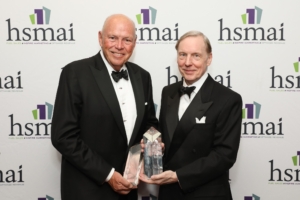 Lee was named Entrepreneur of the Year in 2016 by the University. In addition, he has been recognized by Penn State, the J.L Kellogg Graduate School Northwestern University, the University of Denver, and HSMAI. He has lectured at universities around the world including China and Singapore.
Lee was named Entrepreneur of the Year in 2016 by the University. In addition, he has been recognized by Penn State, the J.L Kellogg Graduate School Northwestern University, the University of Denver, and HSMAI. He has lectured at universities around the world including China and Singapore.
Lee and Mary have been married 53 years. Their many adventures include sports car racing with Sports Car Club of America and Ferrari, where they both graduated from Ferrari’s Advanced Racing Schools in Italy and the U.S. They crossed the finish line of the London Marathon “hand in hand,” and are the first husband and wife pilot team to fly a single engine airplane across the North Atlantic. They flew their own twin engine business jet for over 12 years. Lee and Mary are lifetime sailors and boaters and are members of the New York Yacht Club.
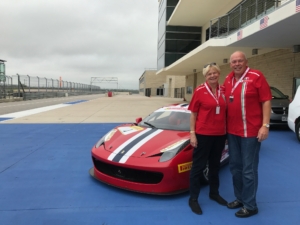
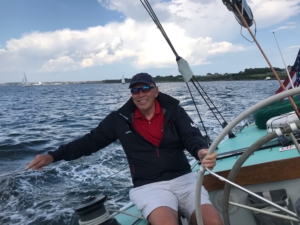



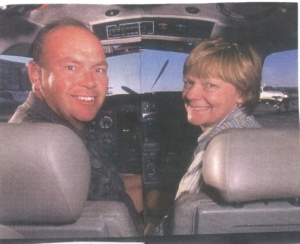
It is an honor for me to have been asked to write a few words about Lee Pillsbury for this well-deserved acknowledgement of his lifetime of achievement. I have known Lee since he joined the Board of Trustees in 2010 and have worked very closely with him during my entire decade as Chairman. I can definitively say that Lee has been one of the most effective Trustees with whom I’ve had the privilege of serving during my 20+ years on the Board.
As a native of Ithaca and an undergraduate at Cornell, Lee joined the Board with a deeper understanding of the issues facing our community than most Trustees – so he hit the ground running from the moment he was elected. In the depths of the Great Financial Crisis, Lee proposed creating a Task Force to focus the university administration and the Board on revenue generating opportunities, not just cost reduction approaches to dealing with the crisis. With a background in real estate, finance, and private investing, Lee brought a level of sophistication to our housing and real estate development discussions that will benefit the university for many years to come.
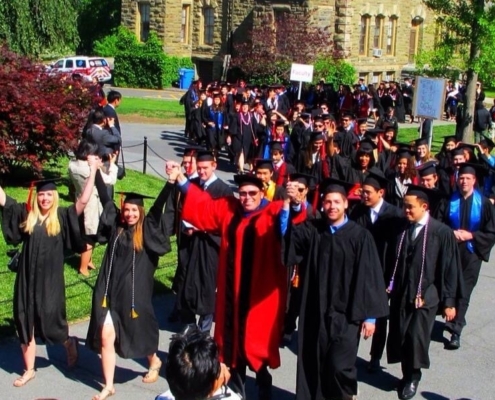
As Chair of the Trustee Buildings and Properties Committee, Lee led the efforts to revitalize graduate student housing at Maplewood and construct a spectacular expansion of North Campus undergraduate housing which will allow every freshman and sophomore to live on-campus and not have to deal with the incredibly tight, off-campus housing market. He was also instrumental in structuring the financing that put a hotel on the Cornell Tech campus on Roosevelt Island.
Lee’s success in transforming the Ithaca campus has already shown positive, knock-on effects off-campus, which he anticipated. Given the competition from brand new Cornell housing, Collegetown landlords have been incentivized to transform dilapidated rental properties of questionable safety into attractive new apartment buildings in compliance with 2023 building codes.
Aside from out-of-the-box thinking, deeply relevant expertise, and generous philanthropy over many years, Lee has also been a Big Red cheerleader and a source of Big Red memories for many Cornellians specially designed Cornell putters and then convincing the Board of Trustees that all of us needed to purchase at least one – with proceeds going to the golf team. And none of us will ever forget the dinner cruises aboard Lee’s Double Eagle yacht, to welcome Cornell’s newest Trustees or to celebrate the university’s special moments, like winning the right to build Cornell Tech on Roosevelt Island. Lee and his wife, Mary, hosted an unforgettable nighttime cruise around Roosevelt Island to celebrate this transformational event in our history.
over many years. He has supported the Cornell golf team, for instance, by commissioning and underwriting the cost of
Anyone who knows Lee knows that he is a big personality — infectious, funny and authentic. He has given back to Cornell much more than he has received for decades. I am grateful that he is my friend.
Robert S. Harrison
Chairman Emeritus
Cornell University
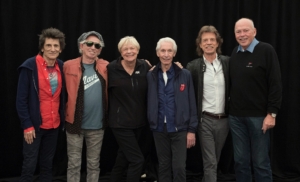
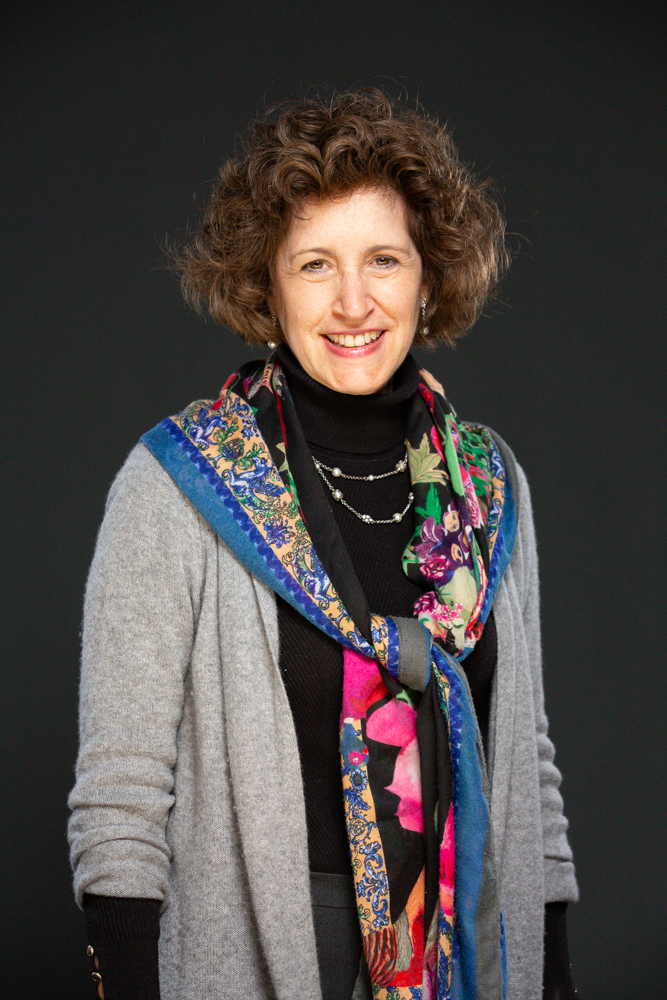 Cindy Estis Green’s career began in corporate marketing and senior operations roles for Hilton International. After founding the data mining and predictive modeling analytics company, Driving Revenue, and selling it to Pegasus Solutions, Ms. Estis Green spent twelve years as managing partner of The Estis Group working with hotel owners on targeting value growth in their assets.
Cindy Estis Green’s career began in corporate marketing and senior operations roles for Hilton International. After founding the data mining and predictive modeling analytics company, Driving Revenue, and selling it to Pegasus Solutions, Ms. Estis Green spent twelve years as managing partner of The Estis Group working with hotel owners on targeting value growth in their assets.
A prolific writer, Estis Green is co-author of several groundbreaking books including the first profile of the hospitality digital marketplace hailed by many as the bible of distribution Distribution Channel Analysis, updated several years later with Demystifying the Digital Marketplace, and a series of Special Reports profiling the rise of Social Media, legal guidelines for the digital market, brand-driven Book Direct campaigns and the Groups & Meetings market. Estis Green has been honored as one of the 25 Extraordinary Minds in Sales and Marketing by HSMAI, was one of the first women inducted into the prestigious Hospitality Technology Hall of Fame and was named as one of Cornell University’s 90 Influential Hotelies.
She launched and has subsequently been the chair of the AHLA Consumer Innovation Forum with the industry’s leading experts in digital and distribution strategy and is highly sought after as a speaker at many global forums on topics related to digital disruption and the impact on the economics of hotels.
Ms. Estis Green co-founded Kalibri Labs, a firm providing a next generation commercial strategy and benchmarking platform to evaluate and predict hotel revenue performance. Using innovative data science techniques including AI and machine learning, Kalibri Labs helps hotel owners and operators optimize profit contribution to improve asset value and supports the real estate community with the tools that refine underwriting for transactions, development and financial restructuring.
Estis Green holds a BS degree from Cornell University and an MBA from The American University.
In an interview with the Lodging Magazine on March 7, 2023:
What initially inspired you to get into the hospitality business?
I studied Human Development at Cornell but got interested in the Hotel School and changed my major when I recognized the career opportunity. I started with restaurants at Disney, then switched to hotels after my MBA for an exciting role at Hilton International to create the industry’s first marketing information systems and research function. I did that for a few years and then became a GM to see how those technology tools can be leveraged by hotels. I haven’t looked back!
Who were some of your mentors or role models, male or female, and what were their most valuable lessons?
The head of marketing at Hilton told me change will be the only constant as technology gains traction. He said, “continually embrace change in your environment and don’t ever get complacent.” My parents were equal partners in running our family business; a children’s camp and indoor tennis club. They taught me that the only limits on my aspirations are self-imposed, that is anything is in my reach. They taught me to work harder than anyone else and be open to learning new skills and I could achieve anything I set out to do. And if didn’t reach my goals that I would never regret anything having given it my all.
In your opinion, how is the lodging industry doing in terms of getting women into leadership positions?
At Kalibri Labs, I have intentionally recruited and developed our women leaders and support many in our client’s organizations to ensure they get visibility to assist in their career growth. In lodging, there is still a lot of institutional bias that has to be persistently chipped away to make real progress. Diversity has proven to yield superior economic results, but it’s a long road and we can’t let up as an industry. I applaud the many organizations and initiatives that have emerged to create forums to raise awareness through improved dialogue along with leadership and diversity training.

Cindy with Michelle Russo ’87; Kate Henriksen ’96; Andrea Foster ‘96 at Hotel Management Top 30 Women’s luncheon
Excerpt from the Hotel Business Magazine, June 2023
CHANGING THE GAME
Kalibri Labs offers insight on the digital market and commercial strategy in new book
By Gregg Wallis, Senior Editor
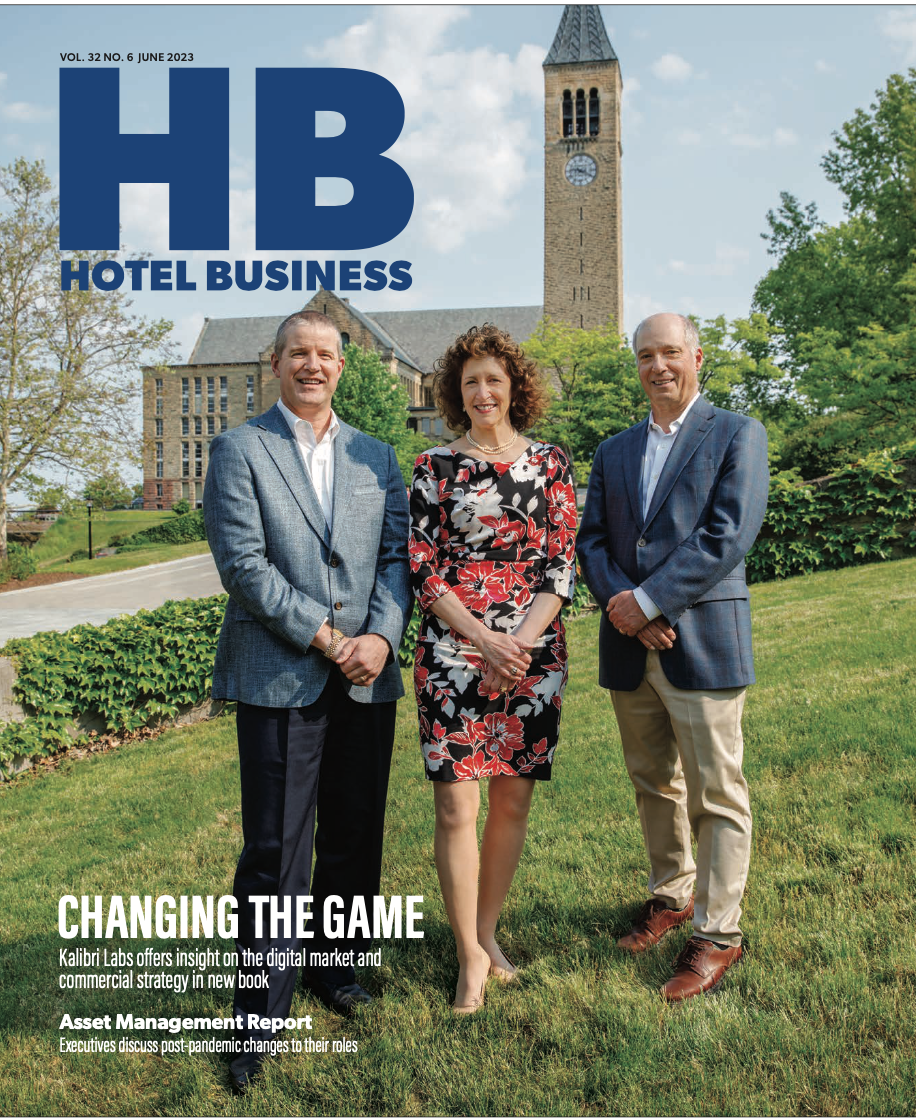
Left to right: Dave Roberts, Cindy Estis Green and Mark Lomanno
The pace of digital disruption in hospitality has only increased since the pandemic, with new rules and new players entering the playing field. To help industry players keep up and, perhaps, give them an edge Kalibri Labs, inpartnership with Hotel Business, has released the latest edition of its popular “Demystifying” series of books, “Demystifying the Digital Market & Guide to Commercial Strategy,” with a look at how to gain customers in a post-COVID world and at the new challenges facing hoteliers. “I wanted hotel industry stakeholders to be well informed about a market that is dominated by digital disruptors,” said Cindy Estis Green, CEO/cofounder, Kalibri Labs. “In a world where debt service has doubled and labor costs have spiked, if hoteliers can make commercial spending decisions through the lens of improving asset value, those owning and operating hotels can thrive. This is the underlying premise of commercial strategy.
Growing asset value is the new North Star for managing hotel performance.”
The book captures the state of the digital market, and Estis Green has collaborated with coauthor Mark Lomanno, partner/senior advisor, Kalibri Labs, to mine data from almost 35,000 hotels to reveal revenue performance, demand metrics and trends by segment, channel, geography and chain scale across the U.S. hotel industry. The book identifies the significant changes in the large digital technology platforms and the hotel brands, and what the implications are for hotel owners and management companies.
For this edition, Dave Roberts, professor, Cornell University School of Hotel Administration, and former SVP, revenue strategy and solutions, Marriott, has contributed to the new section on the emerging discipline of commercial strategy, which paves the way for readers to understand theurgency of measuring performance based on pro t contribution. It also offers a framework to evaluate how customer acquisition techniques can be leveraged to improve asset values and streamlined to improve efficiency in the ways hotels go to market.
Download the book here.
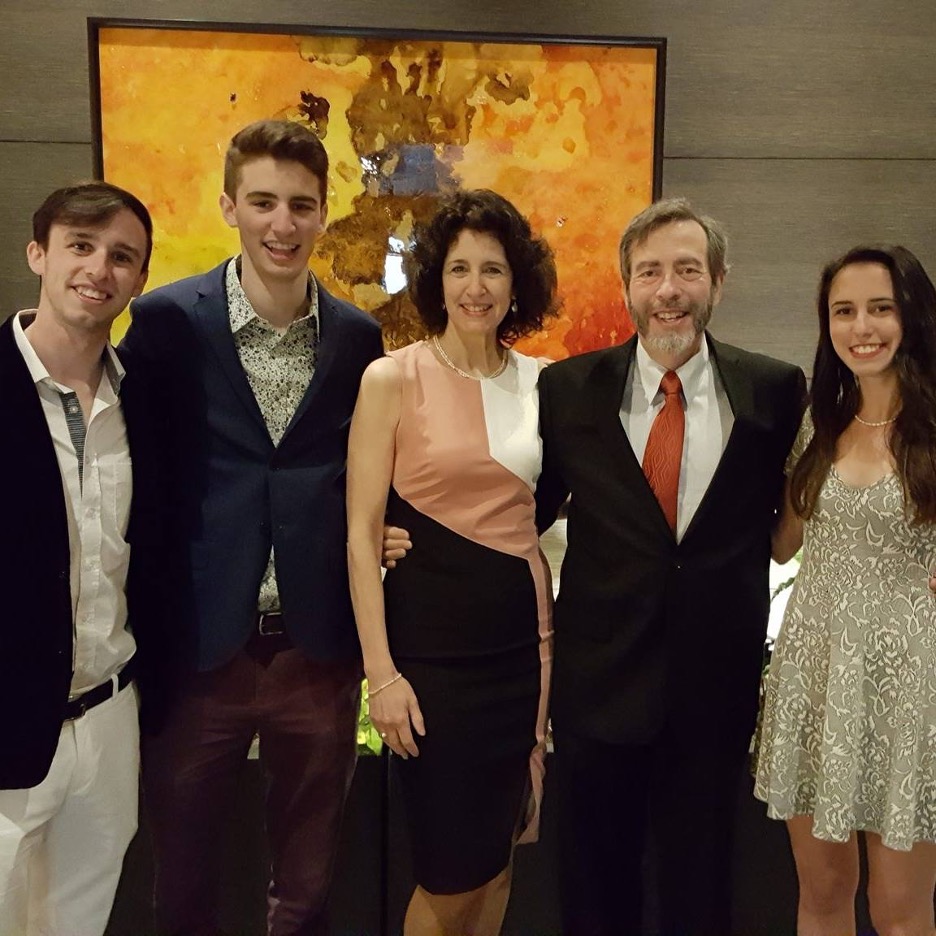
Green Family picture Nathaniel ’13; Micah ’18, husband Jeff (Princeton) and Samara (UNC Chapel Hill ’16)
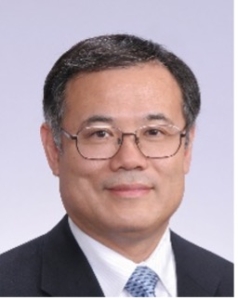 When Chiaki Tanuma’s father Bunzo Tanuma founded his first food service business in 1947, the war had just ended, and he aspired to “do work that contributes to society” as a means of honoring the lives of his subordinates who died during the war. To address the food shortage after the war, Bunzo Tanuma went out of his way to source food to take care of student meals in the dormitory of Keio University, and even provided free meals to students without money.
When Chiaki Tanuma’s father Bunzo Tanuma founded his first food service business in 1947, the war had just ended, and he aspired to “do work that contributes to society” as a means of honoring the lives of his subordinates who died during the war. To address the food shortage after the war, Bunzo Tanuma went out of his way to source food to take care of student meals in the dormitory of Keio University, and even provided free meals to students without money.
From this humble beginning, Green House Group’s guiding principle has been “making others happy leads to our own prosperity.” This simple yet very power motto has guided the company for the past 75+ years on how to run their business and how to treat their customers, partners, the society, and most importantly their employees and their families.
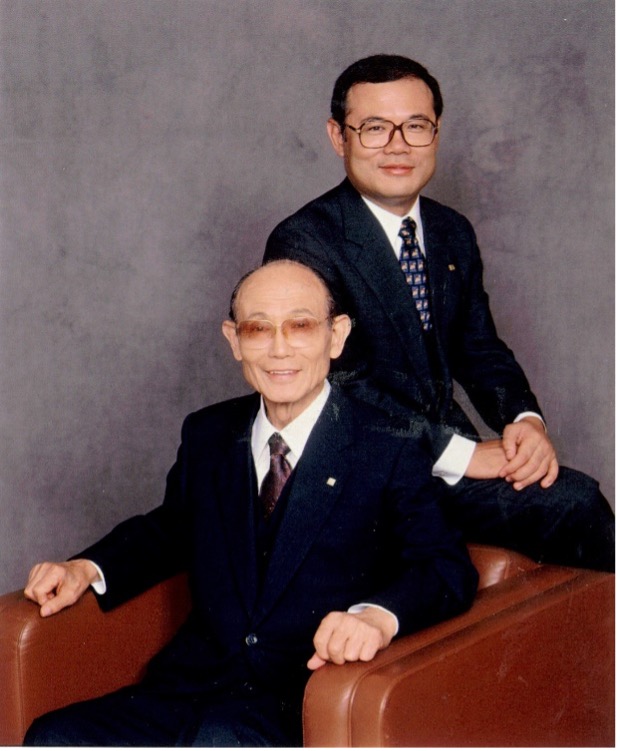
Chiaki Tanuma takes up the post of President of Green House from his father Bunzo Tanuma who takes up the post of Chairman of the Board (1993)
Chiaki Tanuma took over from his father as President and CEO of Green House in 1993 and continued to build on this philosophy, growing the company’s business in contract food services for government offices, company offices, factories, hospitals, nursing homes, schools and other organizations to over 2000 outlets in Japan and overseas. In addition, Green House Group operates hotels, restaurants, and takeout shops throughout Korea, Taiwan, Thailand, Singapore, Canada, The Philippines, China, and Hong Kong, with over 600 locations in Japan and overseas. Within the hotel industry, the group operates 15 accommodations all over Japan including 4 hotels under their own original brand Grand Bach, and offers consulting service as Horwath HTL Japan.
According to Chiaki, “The ability to notice what will bring joy to our customers and taking action is the driving force behind Green House’s innovation in the face of the changing times. This has been and will continue to be the case.”
Chiaki Tanuma enrolled at Cornell University’s School of Hotel Administration, Master of Professional Studies (MPS) Program in 1978. Upon graduation, Chiaki returned to Green House in 1980 and took charge of a project to develop a new restaurant concept. The members of “Team Chiaki,” formed prior to his study abroad, were eagerly waiting for his return and fully supported the project.
The “Kushiage (deep-fried skewers) Restaurant”, which he opened as a new type of restaurant, was a great success. He was one of the first to recognize the increasing number of women entering the workforce and developed “Delicatessen Saboten” as a new business model before the market for home-meal replacement attracted much attention in Japan, which also became hugely successful.
Their Chinese restaurant “Shahoden” developed a Chinese-style “Osechi” (traditional New Year’s food in Japan) that became a big hit. Although the manufacturing process was difficult, Chiaki took the lead in overcoming the difficulties by building various cooperative relationships both internally and externally.
At the time Chiaki became President & CEO, he had said that he would “turn Green House into a company with sales of 100 billion yen,” and in 2006, he made it happen.
Chiaki is sometimes referred to as a “right-brain” CEO. This does not mean everything is from his mere inspiration, but inspiration backed up by careful calculations based on his reading of the current trends of the times. His vision and foresight resulted in numerous ventures such as the acquisition of Nissan Motor’s food service division, the first public listing in Japan in the contract food service industry, and the new foray into the hotel business.
When Chiaki was considering listing Green House, he was anxious and consulted his father whose words at that time, “If you fail, just start from scratch again,” motivated Chiaki. Bunzo Tanuma passed away in 2000.
An elderly man once thanked Chiaki. He said, “In high school, in college, at work, and at the senior citizen’s home where I live now, it just so happens that meals were provided by Green House. My body is made of Green House, and it keeps me healthy.” Chiaki realized the need to provide not only good food, but healthy food as well.
In 2007, Chiaki launched Asken, an internet-based professional advice program for nutritional management. A few years later, the program became a huge hit, thanks to the use of image analysis technology, done in collaboration with Sony, and the widespread use of smartphones.
With Chiaki’s global connections, Green House is aggressively expanding globally, including forming alliances with three major European contract foodservice companies in 2006 and the acquisition of a major Singapore contract foodservice company in 2019.
In 2022, Green House’s Innovation Center “GreeneX Plus” was created as a place to develop and demonstrate cutting-edge digital solutions with various partners. In addition, the suite room of the Hotel Grand Bach Tokyo Ginza was recreated into an Innovation Center. It is used as a presentation room for visitors and potential clients to experience a new era of service that utilizes the know-how of Green House.
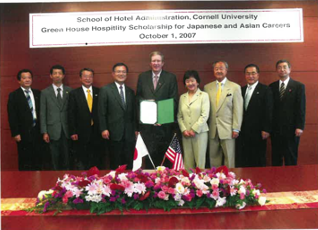 Education and philanthropy in support of future hoteliers has been a passion of Chiaki. In 1997, he established Green House Hospitality Scholarship for Japanese and Asian Careers which has to date supported over 40 students. He also founded the Integrated Hospitality Program of Kyoto University and contributed to establishing the Kyoto-Cornell International Collaborative Degree Opportunity: KC-CDO (Joint master’s degree) in 2019 to offer more global education opportunity to future students from Japan and foreign countries.
Education and philanthropy in support of future hoteliers has been a passion of Chiaki. In 1997, he established Green House Hospitality Scholarship for Japanese and Asian Careers which has to date supported over 40 students. He also founded the Integrated Hospitality Program of Kyoto University and contributed to establishing the Kyoto-Cornell International Collaborative Degree Opportunity: KC-CDO (Joint master’s degree) in 2019 to offer more global education opportunity to future students from Japan and foreign countries.
Chiaki has assumed numerous past and current voluntary leadership roles for Cornell University including President, Cornell Club of Japan; Regional Vice President, Cornell Hotel Society Japan; Advisory Board Member for the Cornell-Nanyang Institute of Hospitality Management; Member of the Cornell University Board of Trustee; and Cornell University Presidential Councillor.
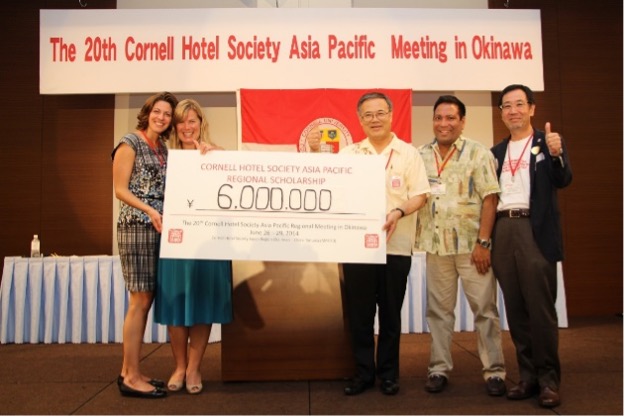

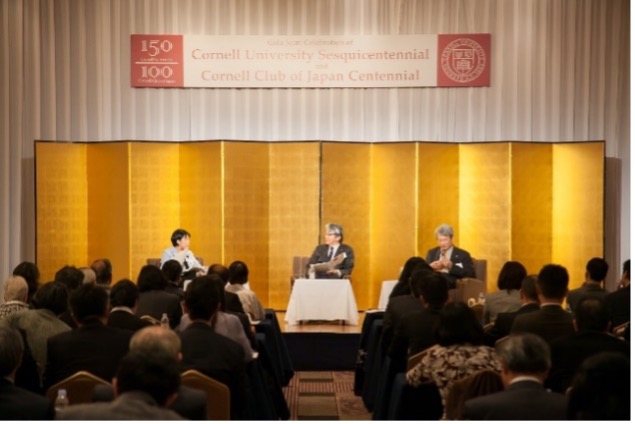
For his contributions to Japan and Cornell, Chiaki was awarded several prestigious awards including:
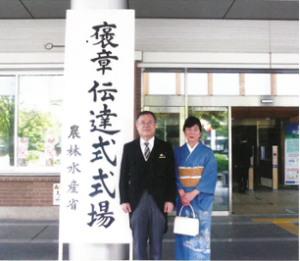
Chiaki Tanuma awarded Ranjuhosho (Medal of Honor with Blue Ribbon) (2011)
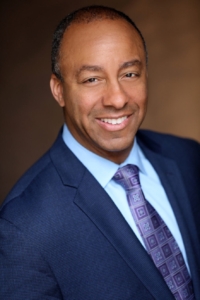 Evan Frazier is the president and CEO of The Advanced Leadership Institute, an organization aimed at cultivating Black executive leadership to strengthen companies, institutions, and communities. In this new role as of March 2021, Frazier guides the mission of The Advanced Leadership Institute to educate, develop, connect, and position Black leaders for executive advancement.
Evan Frazier is the president and CEO of The Advanced Leadership Institute, an organization aimed at cultivating Black executive leadership to strengthen companies, institutions, and communities. In this new role as of March 2021, Frazier guides the mission of The Advanced Leadership Institute to educate, develop, connect, and position Black leaders for executive advancement.
It was Frazier’s early vision that led to the formation of The Advanced Leadership Initiative in 2017 that focused on building the pipeline of talented African American leaders in Pittsburgh. Under Frazier’s leadership as founding director, the initiative partnered with Carnegie Mellon University’s Tepper School of Business to develop a signature program, the Executive Leadership Academy. Since 2019, this world-class executive development program provides the tools, exposure, and training necessary to prepare Black leaders to contribute to their organizations — and the community – at the highest levels.
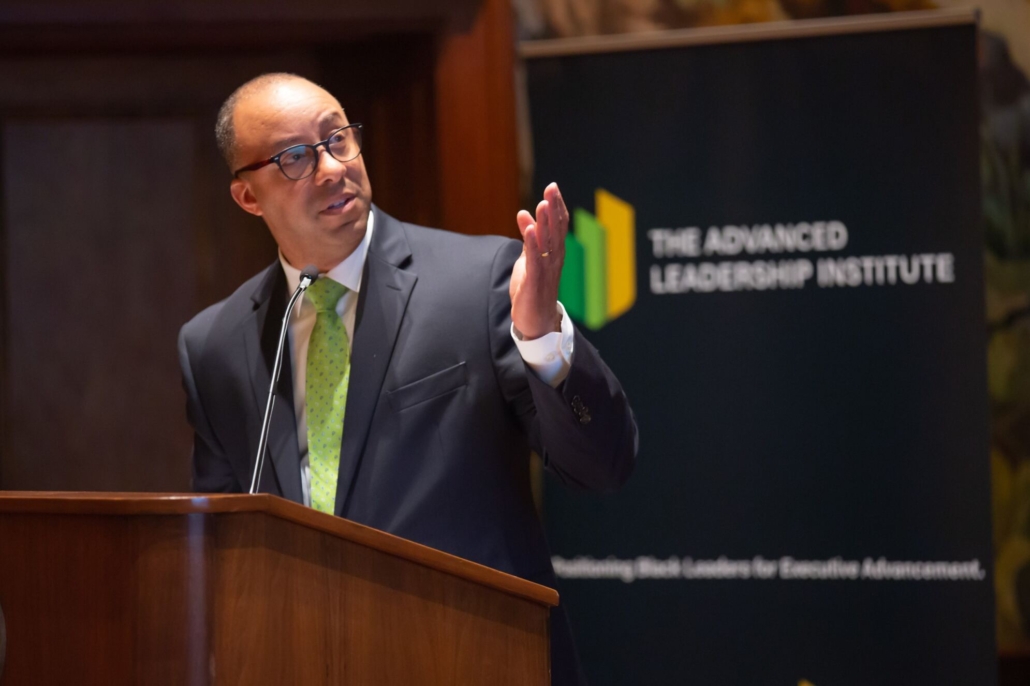
Building on early success of TALI in the Greater Pittsburgh Region, Frazier led the strategic expansion of the organization from Initiative to Institute by extending the portfolio of executive development programs to impact a larger pool of Black leaders locally and nationally.
Before joining TALI fulltime, Frazier served as senior vice president of Community Affairs at Highmark Health – a national $18 billion integrated health, finance and delivery network headquartered in Pittsburgh, Pennsylvania. Prior to his 11-year tenure at Highmark, he served as president and CEO of the Hill House Association; vice president in Strategic Planning and Finance Communications at PNC Financial Services Group; senior vice president at the Manchester Bidwell Corporation and director of Community Relations for Eat’n Park Restaurants.
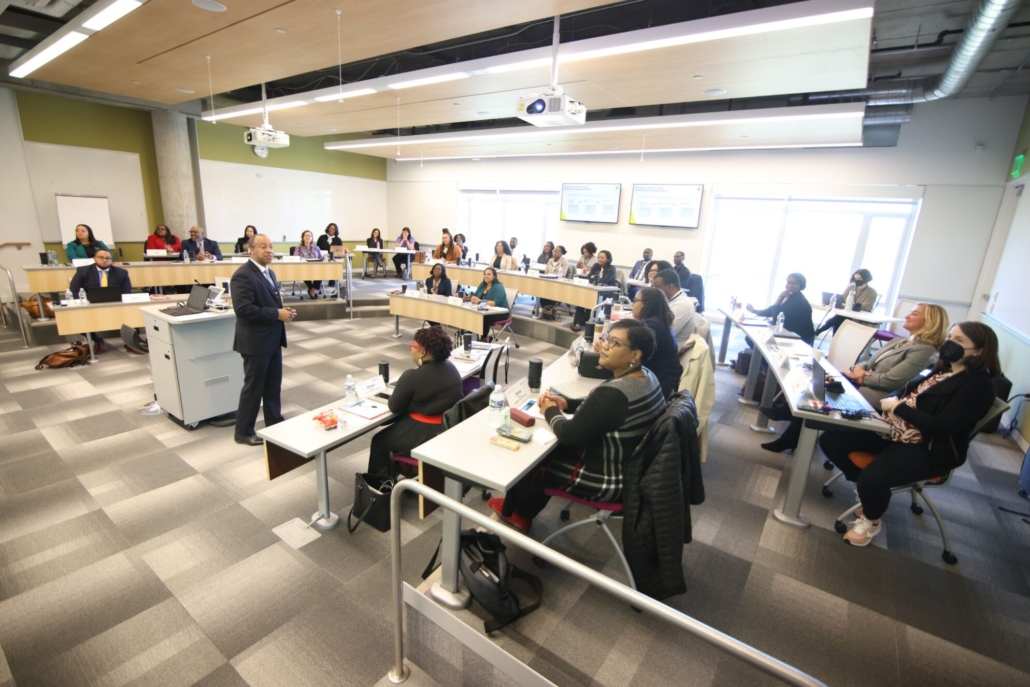
Frazier holds a bachelor’s degree from Cornell University’s School of Hotel Administration, a master’s degree from Carnegie Mellon University’s Heinz College of Public Policy and Management and completed the Wharton Executive Development Program at the University of Pennsylvania. Over the years he also earned executive development certificates from Harvard Business School’s Strategic Perspectives in Nonprofit Management and the Program on Negotiations at Harvard Law School.
In January 2022, Frazier was appointed to the board of directors for Dollar Bank and its parent company Dollar Mutual Bancorp where he serves on the Audit, Enterprise Risk, and Community Relations committees. An active member of the community, Frazier has served on more than 30 civic boards over the years. Currently Frazier is a Life Trustee for Carnegie Museums of Pittsburgh, board member of Bender Leadership Academy, and serves on the executive committee of The Pennsylvania Society.
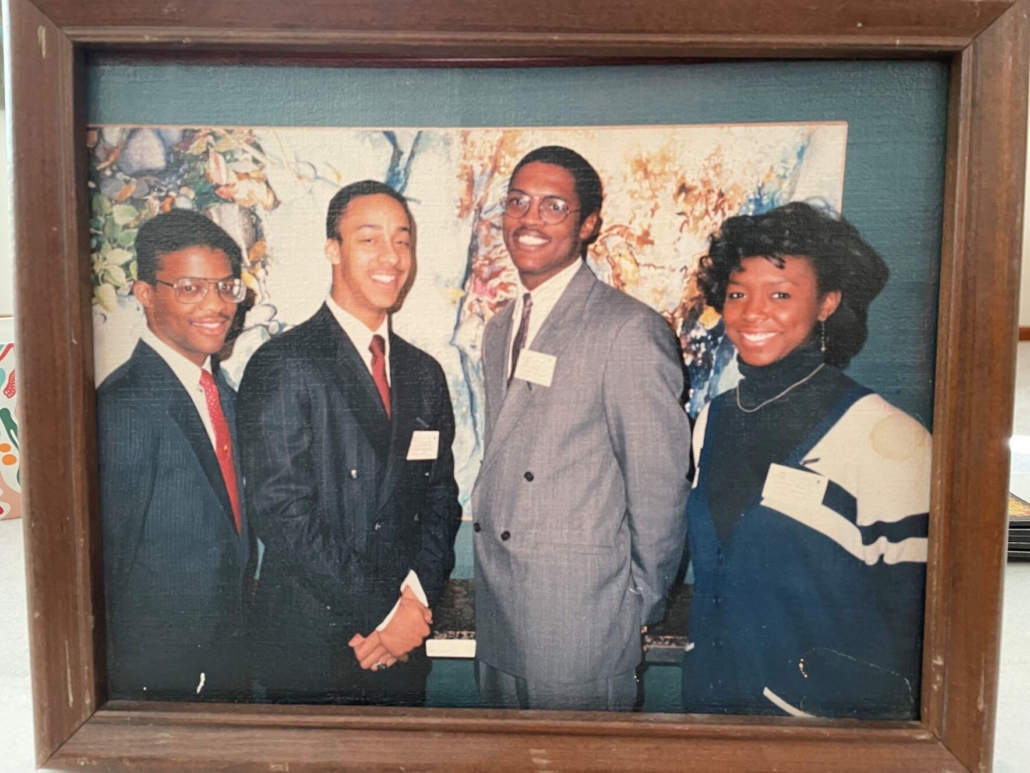
Founders of NSMH in 1990. Michael Burkeen ‘91, Evan Frazier ‘92, Alfred Watts ‘91, and Penelope Wint ’92.
During Frazier’s years as an undergraduate student at the Cornell Hotel School, he co-founded the National Society of Minorities in Hospitality (NSMH) along with Michael Burkeen, Alfred Watts, and Penelope Wint. As National Chair of NSMH during his Junior/Senior year, he established NSMH as a 501 (c)3 charitable nonprofit and hosted the Constitutional Convention in 1992 where NSMH established its first 10 chapters. Now more than 30 years later with several dozen chapters, NSMH as a student-run organization continues to play an important role in minority advancement in the hospitality industry. Over the years, Frazier has served in numerous other capacities with NSMH to include Chair Emeritus, Alumni President, and in 2015 he led an effort to establish the NSMH Legacy Fund at The Pittsburgh Foundation and currently serves as its chair. Also, thanks to the leadership and generosity of Ted Teng ‘79, a distinguished Cornell Hotel School alumnus, the Evan S. Frazier ’92 Discretionary Fund was established in 2022 at the Cornell Hotel School to support student services for NSMH, PSP, First Gen, and other students in need.
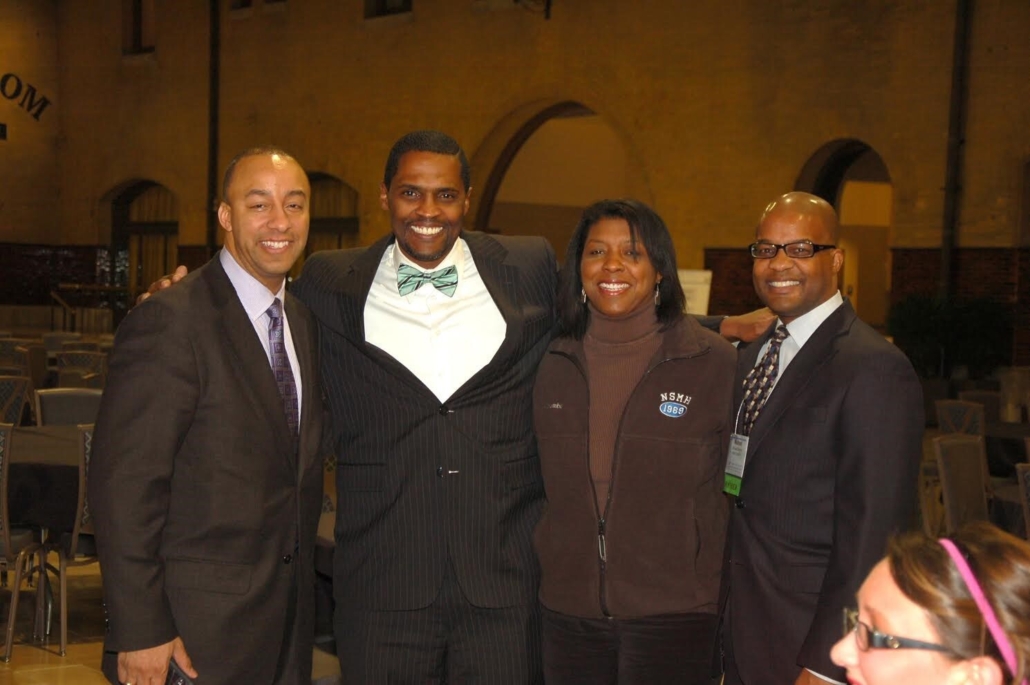
NSMH founders reunited at the 25th Anniversary in 2014.
“Diligent, Persistent, Dedicated. Those are the words that come to mind when I think about Evan and his lifelong career and achievements. Once he has something in mind to do, he dedicates himself to achieving that goal. And the goal that he has often sought after is to aid in the advancement of minorities in whatever sphere he has been in. For the thirty plus years that I have known him, he has diligently pursued this and has forged new pathways for those coming up behind him. He’s what anyone would call a ‘Trailblazer.’ I’ve been greatly honored to witness and occasionally aid in his efforts.” – Penelope Wint ‘92
“I’ve known Evan for nearly 30 years now. We attended the Cornell Hotel School together when I was an MPS candidate in 1992-93 and Evan was an undergraduate. When I first met Evan, it quickly became evident that he possessed the leadership and relationship building abilities to make a significant impact on any initiative he was involved in. Evan’s unwavering passion and enthusiasm to lift Black professionals is obvious in his list of accomplishments – starting with his involvement with the launch of the National Society of Minority Hoteliers at the Hotel School to his current role as CEO of The Advanced Leadership Institute in Pittsburgh. Evan’s work is admirable, and I have always been inspired by his humbleness and willingness to sacrifice himself for others. In my opinion, Evan is the epitome of a consummate servant leader. I cannot think of a more deserving individual of the Hotelie Hall of Fame Award than my friend Evan Frazier. Congratulations!” – Calvin Stovall ‘93 MPS
Evan was featured in the Centennial issue of the Cornell Hotelie Magazine. Here is an excerpt:
“Entrepreneurs are told to find a problem to solve. In 2016, Evan Frazier ’92, then senior vice president of community affairs at Highmark Health in Pittsburgh, didn’t have to look far—the evidence was all around him. African Americans made up 24 percent of the city’s population, 13 percent of the county’s population, and 11 percent of the region’s population—but less than .1 percent of C-suite leadership. “We had lost ground,” he recalled. “Twenty years earlier, nearly every company had at least one or two top Black executives, but they had just disappeared.”
The problem was twofold. Black professionals who felt stuck in their careers were leaving to find greater opportunity elsewhere. At the same time, Black professionals who had been recruited to Pittsburgh “would come here, look around, and—seeing so few others at a senior level—feel isolated and disconnected,” he said. “They didn’t have a sense of belonging, and so they went someplace else.”
Frazier, who was included on Savoy magazine’s “Most Influential Black Executives in Corporate America” list in 2020, had often discussed the need to change the trajectory of the region’s African Americans with other Black executives. Drawing on those discussions, he wrote a concept paper in the summer of 2016 for an executive leadership program and sought feedback from “about 50 people like myself—corporate leaders, foundation leaders, community leaders—who would be directly impacted by the program. I used the feedback to really think about this in a deeper way,” he said.
The result was TALI (The Advanced Leadership Institute), a program he launched in 2018 to build the pipeline of African American leaders in Pittsburgh. After serving in a volunteer capacity as founding director for the first few years, he became TALI’s president and CEO in 2021 and led its transition from an initiative to an institute.”
To read the entire article, click here.
Frazier has won numerous awards locally and nationally including White House recognition and was one of 2020’s Most Influential Black Executives in Corporate America by Savoy magazine. In 1998 Frazier was selected as a Luce Scholar where he lived and worked in Asia for a year, he was a national BMe Public Voices Fellow, a member of Sigma Pi Phi (Rho Boule) and is the author of the book, Most Likely To Succeed: The Frazier Formula For Success.
“Evan is one in a million; I think he’s likely one of the most well-rounded nominees to ever receive this honor. The scope and depth of his impact is significant. Although he is soft-spoken, his impact is LOUD. Everything he touches is made better through his efforts including business, nonprofits, communities, and the people whose lives he has enriched through his time, care and mentorship.” – Jeff Broadhurst ‘91
Frazier is married to Dr. Holly Hatcher-Frazier, an educator and national television personality. They have three children: Evan Jr, Nia, and William.
 Coined as a natural teacher and referred to as a “rock star” by audiences who hear his message, Karim Abouelnaga ’13 is a young, dynamic entrepreneur that we can all learn from. Born to immigrant parents, raised by a single mother, and astutely navigating the streets and his inner-city public schools, Karim was the first one in his family to attend college and won over a quarter million dollars in scholarship and aid to attend and graduate in the top 10% of his ivy league university, Cornell. Upon graduation, he turned down his Wall Street job offer to commit his life to educational equity.
Coined as a natural teacher and referred to as a “rock star” by audiences who hear his message, Karim Abouelnaga ’13 is a young, dynamic entrepreneur that we can all learn from. Born to immigrant parents, raised by a single mother, and astutely navigating the streets and his inner-city public schools, Karim was the first one in his family to attend college and won over a quarter million dollars in scholarship and aid to attend and graduate in the top 10% of his ivy league university, Cornell. Upon graduation, he turned down his Wall Street job offer to commit his life to educational equity.
At 18, Karim founded PRACTICE to level the playing field over the summer for kids growing up in disadvantaged neighborhoods just like him. In the two years after college, Karim and his team raised over $2 million from some of NYC’s most well-respected philanthropists – including the Rockefeller, Tisch, Mailman, Sackler, and Ackman families – all before turning 24 years old.
In 2016, Karim led PRACTICE’s transition from a 501(c)3 nonprofit to a for-profit certified Public Benefit Corporation to sustainably scale the organization’s reach and impact without philanthropy. Since inception, PRACTICE has partnered with over 200 schools, served over 35,000 inner-city youth and trained over 1,000 aspiring educators. Karim’s rise from poverty to ivy league education to operating a multi-million-dollar education company before the age of 25 redefines possibilities and brings truth to the notion that you can do good for the world and do well for yourself.
At 26, Karim published his first book, Breaking Through from Rough to Ready, at 29 published his second book, The Purpose-Driven Social Entrepreneur and is currently working on releasing his third book with practical changes that could be made to improve our country’s public school system.
Karim is a sought out motivational speaker and keynote because of his personal experiences and success. He engages his audiences on the topics of equity, community engagement and revitalization, and leading with purpose. His talks have spanned corporate stages (for McDonald’s and Ford) to the TED stage, where Inc and Business Insider named Karim’s TED Talk one of the 9 Most Inspiring Talks of 2017, alongside those of Elon Musk and Tim Ferris.
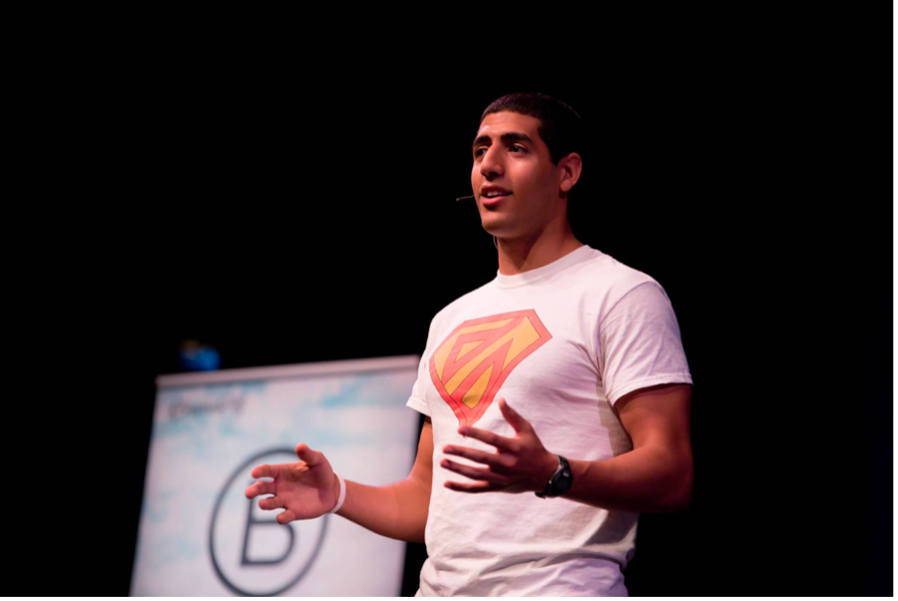
Here is his TED Talk – A Summer School Kids Actually Want to Attend.
Karim is a 2017 TED Fellow, a 2014 Global Good Fund Fellow, and a 2013 Echoing Green Fellow. At 23, he was named to Forbes’ 30 under 30 list in Education, and at 24 was named to Magic Johnson’s 32 under 32 list. In 2016, he was ranked in the top 3 most powerful young entrepreneurs under 25 in the world. Karim’s Forbes day-in-the-life feature is Forbes’ most viewed video of all time, with over 4.5 million views. He earned a Bachelor’s in Hotel Administration from Cornell University and a Master’s in Education Policy from Columbia University.
Karim started PRACTICE while in his dorm room at Cornell University. In his first semester at Cornell, he realized the significant difference in his K-12 experience compared to that of many of his friends on campus. There, he rallied a group of classmates to create an organization to level the playing field for low-income children. Karim was determined to change the inequities he experienced in the public schools he grew up in to ensure that a student’s zip code doesn’t determine their future.
As CEO, Karim understands the importance of first-hand experience when working with urban schools and that is the foundation of our inside-out approach to education. PRACTICE’s leadership team and tutors are of and from the communities they serve. A majority of their tutors are college students working on undergraduate or graduate degrees who intimately understand the realities of urban classrooms and are driven to help urban students like themselves reach their full potential.
Karim speaking at Cornell Entrepreneurship Summit 2013, Purpose, The Nothing That Makes You Something.
PRACTICE’s model combines the best of traditional educational organizations with proprietary, cutting-edge solutions, a first-hand knowledge of urban school systems, and a strong focus on data and outcomes.
PRACTICE’s work includes a rigorous, culturally responsive curricula taught by Education Champions that look like the kids they serve, as well as software solutions built to help students succeed, that connect parents and educators, and provide real-time insights and data from both inside and outside of the classroom.
The education programs include two important elements: mentoring and academic enrichment. The academic curriculum aligns with local and national standards and focuses heavily on math, reading, and English. However, the most unique element of the model is the use of peer tutoring and mentorship. For PRACTICE, learning by example is one of the most powerful vehicles of change.
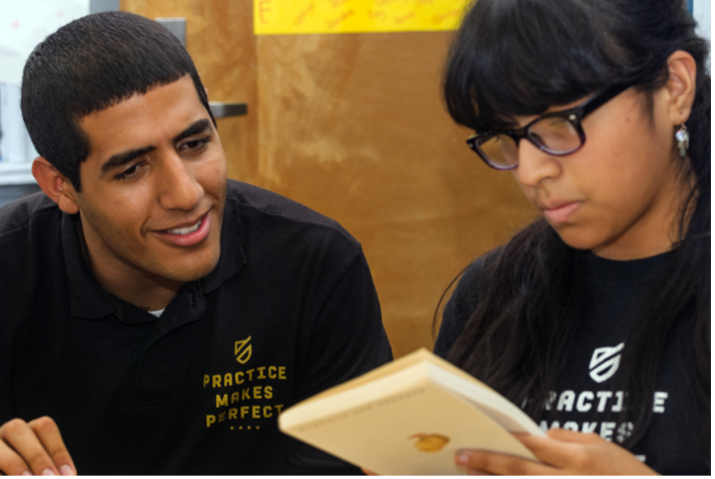 Responsiveness is a hallmark of its approach, and everything is highly customized to meet the specific goals of each principal as well as the unique needs of each school and community. PRACTICE is a partner, not a vendor to the schools. They know the pressures principals face every day. Their approach is based on respect for teachers and administrators. Together, they develop robust programming, a rigorous, culturally responsive curricula and software solutions that help improve student outcomes.
Responsiveness is a hallmark of its approach, and everything is highly customized to meet the specific goals of each principal as well as the unique needs of each school and community. PRACTICE is a partner, not a vendor to the schools. They know the pressures principals face every day. Their approach is based on respect for teachers and administrators. Together, they develop robust programming, a rigorous, culturally responsive curricula and software solutions that help improve student outcomes.
The services PRACTICE offers to educators include:
Here are some case studies of the work Practice does.
PRACTICE also offers customized services directly to parents. Their bespoke approach to tutoring allows parents to provide their children with customized, classroom-compliant support on a flexible schedule that works for each family.
The Education Champions understand the realities of urban classrooms. They partner with teachers on the parent’s behalf to provide every student with an engaging, culturally responsive learning experience that aligns and amplifies their classroom learning.
The Education Champions who provide private tutoring are undergraduate or graduate students from some of our nation’s top colleges. They are driven to help diverse students like themselves reach their full potential.
The expert team of educators have developed a thoughtful and proven model that is both evidence-based and outcomes-focused. It not only helps students excel academically but increases their confidence, happiness and gets them excited about learning.
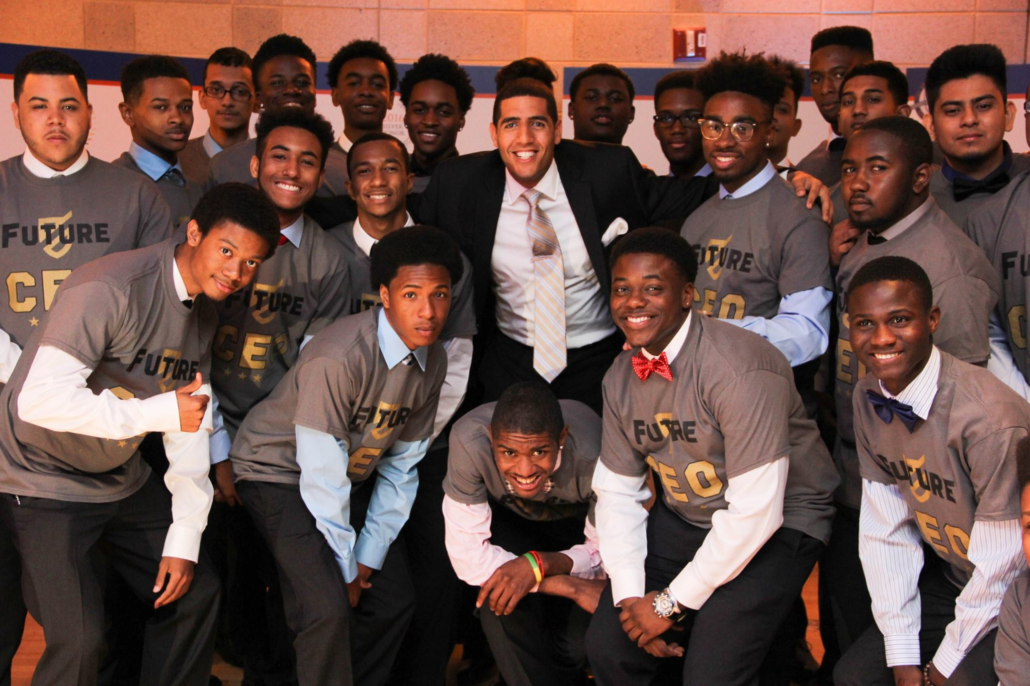
2009
McKinsey issues The Economic cost of the US education Gap highlighting the summer learning loss.
2010
A late-night conversation in a Cornell dorm room hatches the idea to help underserved kids in school.
2011
Practice Makes Perfect launches as a non-profit with first summer program to stop the summer slide.
2013
Receives Echoing Green Fellowship and recognition by Clinton Global Initiative
2015
Forbes names Karim Abouelnaga as a 30 under 30 in Education
2015
Receives first contract with NYC DOE
2016
Practice Makes Perfect incorporates as a Public Benefit Corporation
2017
Named to B-Labs Best for the World list for governance and customer impact.
2017
Karim’s TED Talk named one of the 9 Most Inspiring of 2017
2018
School year services added for full year programming.
2020
Achieves milestone of 20,000 students served.
2021
Practice Makes Perfect renames as PRACTICE Benefit Corporation
2022
PRACTICE expands to serve Denver Public Schools partnering with two schools, Munroe Elementary School and Castro Elementary School
Karim is married to Kadaicia-Loi and they are expecting their first child at around the time of the Hotelie Hall of Fame. They live in Tampa Bay, Florida. Karim is serving as the President of the Cornell Club of Tampa Bay.
